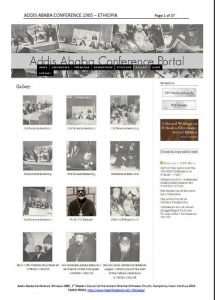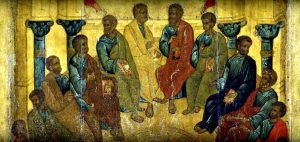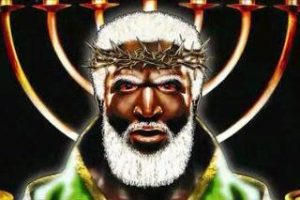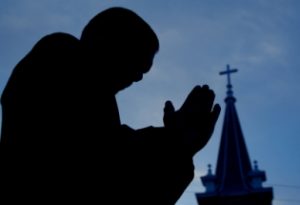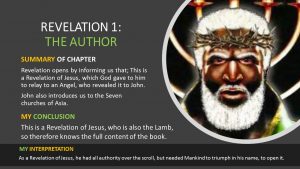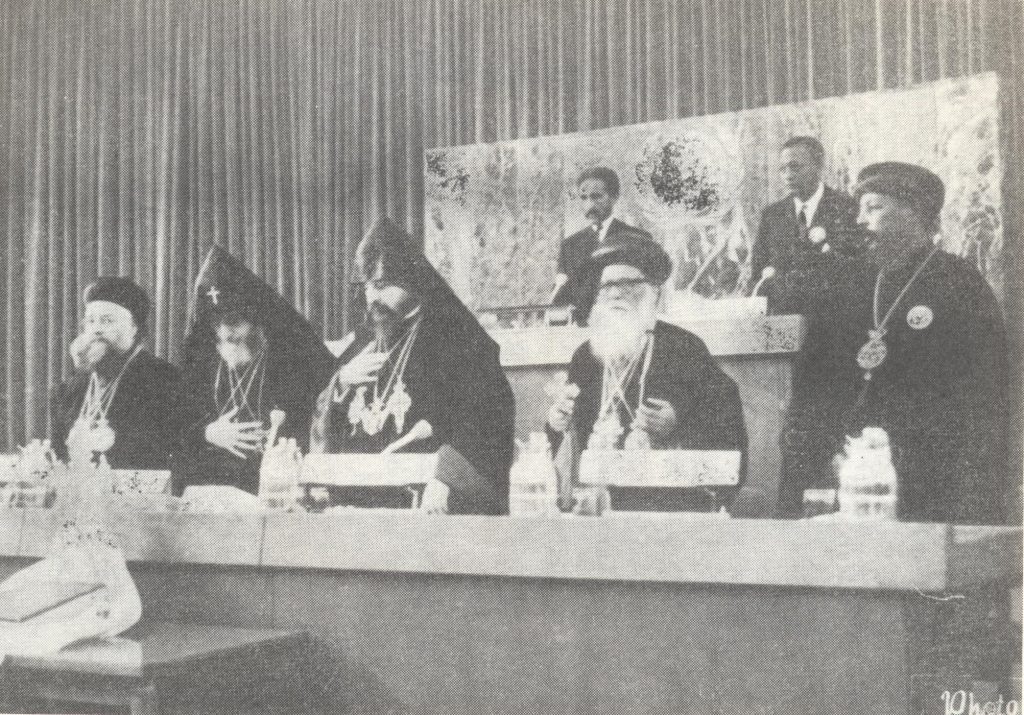

INVITATION’S
His Imperial Majesty
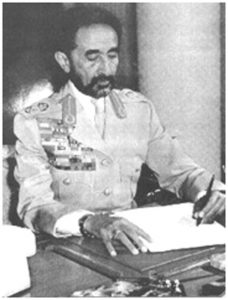
THE CHURCHES
1. Coptic (Egyptian) Orthodox
2. Syriac (Syrian) Orthodox
3. Armenian Apostolic Orthodox (II)
4. Ethiopian Tewahedo Orthodox
5. Indian Malankara Orthodox
Listen to the Preamble (Below) Recited
THE PREAMBLE
Decisions adopted by the Conference of the Heads and Delegates held in Addis Ababa during;
January 15 – 21, 1965.
( I )
It is a great joy for us to meet in a Conference convened by His Imperial Majesty Haile Sellassie I. Emperor of Ethiopia, and study ways and means of strengthening the bond of unity between our sister churches and recovering their spiritual forces for a greater witness to God, our Heavenly Father, in faithful obedience to our common Lord Jesus Christ and through the power of the Holy Spirit.
( II )
We believe that this Conference opens a new era in our history. It is our firm hope that our meeting here is really the beginning of an age of Councils to be held in future, linking our churches with the state of unity which they had during the period of the three ancient Ecumenical Councils of Nicea, Constantinople and Ephesus, and enabling them with renewed strength and vitality to further the redeeming purpose of God in the world.
( III)
In our deliberations at this Conference we agreed to examine the findings and recommendations submitted by a Committee of our theologians whom we had appointed. Thus we concentrated our attention on the common task of our churches in relation to six specific themes which are of utmost importance at the present time.
Given Here Are Our Decisions.

Listen to the Resolutions (Below) Recited
RESOLUTIONS
(I)
The Defender of the Faith
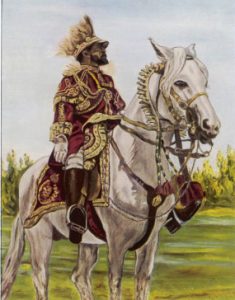
We, the Heads of the Oriental Orthodox Churches, assembled with our delegations in the conference, solemnly declare His Imperial Majesty Haile Sellassie I Emperor of Ethiopia as the “Defender of the Faith.”
(II)
We, the Heads of the Oriental Orthodox Churches, assembled with our Delegations in Conference, at the successful conclusion of our sessions, are happy to pay tribute to His Imperial Majesty Haile Sellassie I, whose initiative and foresight made this meeting possible.
In this His Imperial Majesty follows the tradition of other great and inspired rulers who have played their appointed part in Christendom and have deserved the title of Defenders of the Faith.
The conference expresses its gratitude to His Imperial Majesty and to the Ethiopian Orthodox Church for the work and efforts which have gone into the arrangements for this Conference. It thanks the Secretariat with its Head, the distinguished Secretary General, for the excellent arrangements at this Conference.
The members of the Conference have been extremely happy to visit the beautiful land of Ethiopia and to know its faithful and devoted people.
We raise our thanks to Almighty God for this meeting in love and brotherhood. We are confident that, with the blessing of Divine Providence, this meeting will be followed by others which will enlarge and strengthen the foundations so happily laid, for the good of our Churches and of Christendom.
(III)
We, the Heads of the Oriental Orthodox Churches, assembled with our Delegation in Conference, wish to express our deep feelings of gratitude and appreciation for all those who have shared in helping the initiative of His Imperial Majesty to come into existence.
To those who have carried the burden of long preparation through correspondence and delegations who visited our churches more than once. To those who arranged the facilities to make our stay so happy and pleasant.
Special tribute is rendered to the silent workers, the Ethiopian theologians and young people who worked in the translation, clerical work, transportation and all Secretariat, under the wise guidance and patience of the Secretary General, Ato Abebe Retta.
We thank the Clergy including the Debtera (singers) in the Churches in which we worshipped together. We appreciate the hard work of the two lady secretaries who came especially from Geneva to help us in recording the minutes. We also extend our gratitude to the World Council of Churches who graciously made them available to us.
FREE DOWNLOAD
The Addis Ababa Portal Booklet
The Lion of Judah
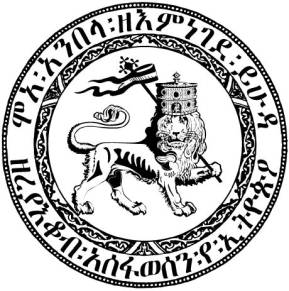
Seal of Emperor Haile Selassie Ist
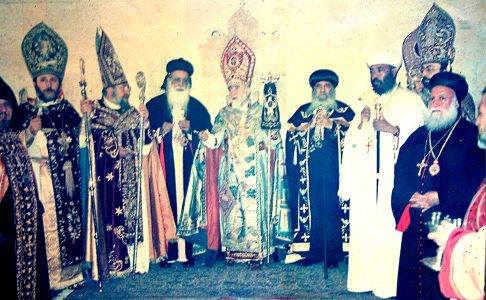
About this Portal Page
Why The Addis Ababa Conference Portal is reproduced here?
The Addis Ababa Conference Page
The Introduction.
This page has been provided by the Temple of Yahshuah Website, to help our visitors to learn about and to study the Addis Ababa Conference of 1965.
This page has been adapted from the Addis Ababa Conference Portal powered by the Orthodoxy Cognate PAGE.
This information in the format it was first presented and provided through this portal and Cognate Page website from 2015 to 2018, is unfortunately no longer available.
Therefore access to this information is not as easy or as freely available to researchers, although the Orthodoxy Cognate PAGE, as well as other internet websites, do still carry all of this content. However, the original portal published to commemorate the 50th Anniversary that featured the conference’s minutes, resolutions, declarations, speeches, debates and outcomes, in its entirety, unfortunately, no longer exist and has been taken down or off the inetrnet. Luckily anf fortunately, Imani Yahshuah, copied and archived the entire portal information back in August 2016, including all the images, in order to develop it, into a booklet format, for himself and for easier distribution among his associates. This page has therefore been developed from this booklet, with direct access to the former portal to check accuracy, accessed by backdating the www. through Archive.com.
Listen to the Introduction (Above) Recited
The Addis Ababa Conference Page
The Purpose
The purpose, of reproducing the 1965 Addis Ababa Conference Portal here, within the Temple of Yahshuah website, is to provide our visitors with quick and easy accessibility to this invaluable information, in a centralised for-mat. This will enable them to have access to the entire proceedings, through just one web page.
This is hoped, to help our visitors, and those particularly interested in the history and heritage of Christianity in Africa, and in particular, over the last century, learn more about this conference, as well as research and familiarise themselves with, the background, the deliberations, the declarations and conclusions of this most holliest of meetings.
In addition, to raising people’s awareness about this conference, it is also hoped that people will begin to recognise the true symbolic significance of this conference, in world history and begin to, themselves reflect upon their own individual response as Christians, or even non-Christians, to many of the issues raised within the conference, and try themselves to incorporate some of the strategies and principles.
As The Temple of Yahshuah, is also a totally African- Centred Christian website that has been developed, with and through Ethiopian Spectacles, it is also hoped that this page will help to highlight the importance of not only Christianity in Africa, but the specific roles Ethiopia & Egypt have played, in its early development up until our modern age.
Listen to the Purpose (Above) Recited
The Addis Ababa Conference Page
The Importance
The importance of the 1965 Addis Ababa Conference, cannot be overstated, not only for African’s or Christian’s, but for all humanity in general. Likewise, a conference such as this, held in Africa, in itself, is of great importance to all African people, however the true importance, significance, relevance and value of this conference, in our modern age, particularly for Christians, can neither be underestimated.
The conference has many symbolic significances, both historically and religiously, as well as, culturally and most importantly spiritually. An increased awareness and knowledge of this one single conference, can therefore, go some way in dispelling many misconceptions and attitudes, people may have in regards to Christianity and Africa, or African peoples connection to it. Knowledge of the conference can also challenge peoples notions on the role African people have played in shaping the ancient, as well as, our modern Christian world.
Also, of great importance is the role, influence and status that was afforded to the Emperor of Ethiopia, Haile Selassie the 1st, who is also a founding pillar and central figure, throughout this website. It is therefore also of great importance that His Majesty’s, role, his mission and accomplishments, also be reassessed and realigned with his true physical historical experience and reality. Therefore, this awareness of the conference should also, help to reclaim the Emperor’s legacy, as one of the greatest African Christian leaders of all times, and like those that came before him, helped to champion the cause of Yahshuah, from a totally African perspective, in Africa and throughout the world.
Listen to the Importance (Above) Recited
The Conference Letter of Invitation
The Original Conference Letter of Invitation, written by HIM Haile Sellassie Ist
Listen to the Invitation Letter Recited Below
Letter written by: HIM Haile Sellassie Ist
The English Translation of His Majesty’s Haile Sellassie Ist Original Letter of Invitation Sent to the Heads of the four Oriental Orthodox Churches.
Sent On: 18th May, 1964

Your Holiness,
We extend loving and friendly greetings in the name of our Lord Jesus Christ.
Ever since Our ascension to the throne, by the will of the Almighty God, of our fathers, it has been our great desire to see representatives of the Ethiopian Orthodox Church and her traditional sister Oriental Orthodox Churches gather around one table in our capital city to strengthen their unity in faith and further their good relations as well as to solve their common problems by mutual exchange of ideas. Because of our expressed desire to see this noble objective achieved, namely, the extension of God’s kingdom, we have at last decided to convince such a meeting.
Our great fathers met first at Nicea, then at Constantinople, and finally at Ephesus. Notwithstanding the very long period that has elapsed since then, the spirit of unity in faith of these sister Oriental Orthodox Churches has been maintained. This fact has encouraged us to convince this meeting. If the representatives of our Churches meet once again, there is no doubt that the common faith will be further strengthened.
Other Churches and Denominations have their own separate meetings to discuss their common problems and to strengthen their unity.
Now more than ever before, when the Churches are faced with great responsibilities and need greater strength, it is quite appropriate that the leaders of our Churches should meet together to discuss common problems and exchanges ideas. Your Holiness is well aware of the great need and usefulness of such a meeting.
It is, therefore, our desire that these ancient sister Churches should meet together in order to strengthen their unity in faith, to discuss points of common interest, resolve their common problems, and especially to pave the way for the ultimate reunification of the divided Churches of Christ.
We are happy to arrange such a meeting of the leaders of the sister Oriental Orthodox Churches to be held here in our capital city of Addis Ababa from September 25, 1964 to October5, 1964.
With great personal regards to your Holiness, We extend this invitation hoping that your Holiness will be able to attend and participate in this meeting. We wish Your Holiness all peace from God and good health.
(Signed.) HAILE SELLASSIE I, EMPEROR
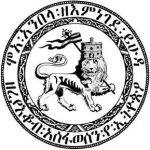
The Introduction to the Conference
The background, introduction & significance of Addis Ababa Conference
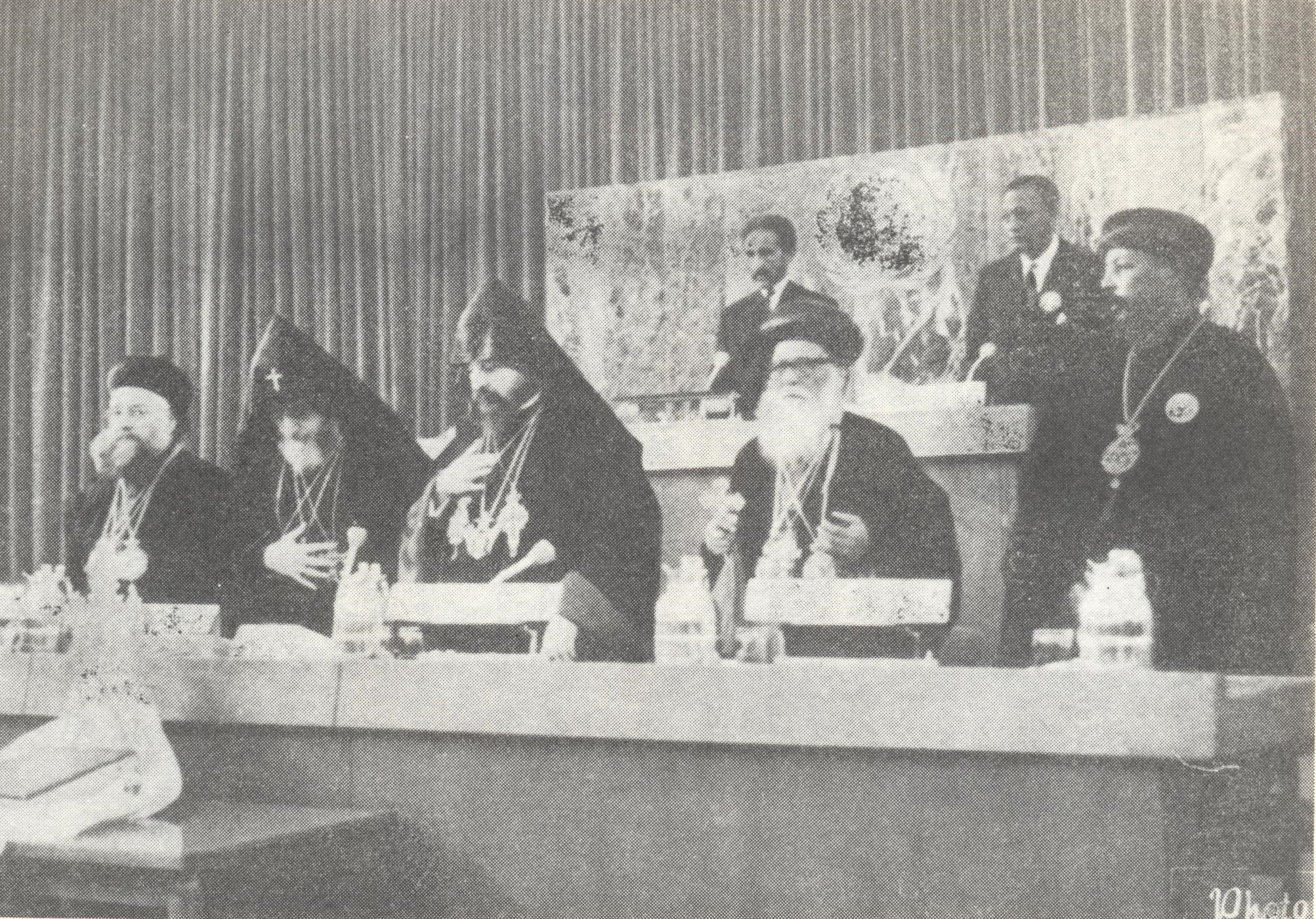
Welcome to the Conference Portal
The Addis Ababa Conference Portal was originally powered by the Orthodoxy Cognate PAGE.
The Addis Ababa Conference was a historic event held in 1965 which brought together the Primates of five Ancient Oriental Apostolic Orthodox Churches.
The participating Churches where;
1. Coptic,
2. Syriac,
3. Armenian,
4. Ethiopian and the
5. Indian Orthodox Church.
The Primates were;
1. Pope Cyril VI of Alexandria,
2. Patriarch Mor Ignatius Ya`qub III of Antioch and All East,
3. Catholicos-PatriarchVazgen I of All Armenia,
4. CatholicosKhoren I of the Greater House of Cilicia and Catholicos of the East and
5. MalankaraMetropolitan Augen I of India.
Fr Dr. V C Samuel of India who was the Dean of the Theological College of the Holy Trinity as well as the Secretary of the Faculty Council of the Addis Ababa University was a key personality behind the success of the conference. He helped organise the Conference with the initiative of both the Emperor Haile Selassie I and the acting Patriarch of Ethiopia, Abune Theophilus (later Patriarch).
The year 2015 marked the fiftieth (50th) anniversary
of the great and holy Conference of Addis Ababa.
The Introduction
The conference of the Heads of oriental Orthodox Churches, which was held in Addis Ababa, Ethiopia, during January 1965, is undoubtedly an event of some importance in the history of the church in our times. For the first time in history is brought together in a formal meeting the Heads of five of the historic Churches. Accompanied by a few delegates each, they came together and thereby inaugurated a new era of cooperation and communication among their Churches. Although these five Churches have all along recognized one another officially as sister churches holding full Eucharistic fellowship with each other, they have not had a common council or synod after the fifth century. The Addis Ababa Conference has now brought to an end this practical isolation one from another of these Churches and opened up a new age in which they may be expected both to manifest concretely their unity and to play their role together in serving the Christian cause in the modern world.
The Addis Ababa conference of the Heads of Church lasted only about fifteen days. But it did pave the way for the participating churches leap over more than fifteen centuries of mutual isolation. For it was at Ephesus in 431 A.D that these churches had their last common council. Now after so many long centuries, this conference has offered them the beginning of a new era of cooperation. This should indeed be followed up through coordinated planning and concerted action so that the churches concerned may be enabled to manifest the unity which exists among them and can promote the cause of the church in the modern world.
It is with this goal in mind that their Holiness’s the patriarchs have, through the conference, adopted the decisions which are published in the present volume. In fact they have sanctioned the appointment of various committees, which in the light of adequate study and comprehensive vision will draw the attention of the Churches to the many tasks which they have to fulfill. Existing as it does in an age of science, the church should be able to combine with its spiritual purity the many insights which science offers. From this point of view, the plan of creating a centre for evangelistic studies and an institution for higher theological learning is to be heartily welcomed.
The conference of the Heads of churches which took only a week was preceded by another week of preparatory work by specially delegated theologians. The task of organizing them both needed several months of planning. In fact, the very idea of the conference reached its maturity after several years of contemplation. Behind all this there was his Imperial Majesty Haile Selassie I, Emperor of Ethiopia, who convened the conference, there by giving it a setting similar to that of the Councils of the ancient Church. So it was quite fitting that the conference conferred on the Emperor the little, “Defender of Faith”.
This Conference is only a beginning – just a humble one at that – towards leading the Church concerned to realize and fulfill their God-given mission in the world. But we have firm hope in the power of God who will continue the work thus begun, so that it may bear fruit to his glory.
We believe that our Lord Jesus Christ who sumptuously fed five thousand men with the negligible provision of five loaves and two fishes will lead the churches in this great work.
In this connection, a special word of appreciation is due to the diplomatic missions of the Government of Ethiopia for their commendable service in communicating most promptly all the necessary messages relating to the Conference to the various Churches. While extending to the members of the various committees, the interim Secretary, and his assistants, the sincere appreciation and thanks of the secretariat, of the conference, may I express my profound joy to see that this document is being published, and that its copies will be placed in the hands of all those who love the church.
A Word About The Churches
The five churches which took part in the Addis Ababa conference have, each of them, a long history, which in most cases can be traced back to the first century of the Christian era. At the same time, with reference to the fifth century Christological controversy they remain loyal to the Alexandrine theological tradition as it had been declared orthodox by the council of Ephesus in 431. On this ground they renounce the council of Chalcedon held in 451, which, they maintain, did practically contradict the council of 431.
In consequence of this stand as well as of various other causes these Churches have been made to face disabilities of many kinds. This, to be sure, is one of the main reasons why these Churches happened to be isolated both from the rest of Christendom and from one another.
However, in spite of all such disadvantages they have continued to exist in the world holding to “the faith once delivered to the saints”, and today they include in their total membership over twenty million believers.
All these five Churches are members of the world council of churches. The wind contacts which this offered had led many in these churches to hope and pray for a common council of their own churches to be convened. The leaders of the world council of churches have also been showing much interest in such a development.
The Conference Arrangements
The Lord of the church answered the prayers and put into the main of His Imperial Majesty Haile Sellassie I, Emperor of Ethiopia, the idea of convening a conference of the Heads of these Churches in his own capital city, as a first step towards bringing the churches into a state of concrete unity and mutual cooperation. A devout member and protector of the Ethiopian orthodox church which is one of the participating churches, the Emperor himself had, ever since has elevation to the imperial throne of Ethiopia, been waiting for a suitable occasion to call together a conference of these churches.
At last the time came, and on 18th May 1964 the Emperor sent out invitations to Heads of the Churches, requesting them to take part in a conference which he was planning to convene. On receiving their replies of acceptance, he entrusted the responsibility of making the necessary preparations with three local committees. These were a program committee under the chairmanship of His Beatitude Abuna Theophilos, Archbishop of Harar and Deputy Patriarch of the Ethiopia Orthodox Church; a Reception Committee led by His Excellency Balambras Mahetheme Sellassie, Minister of public Works of the Ethiopian Government; and a Secretariat with His Excellency Ato Abeba Retta, Minister of public Health of the Ethiopian Government, as Secretary General.
These Committees, in cooperation with the staff of the Theological College of the Holy Trinity and persons like the Reverend Father T. Paul Verghese of the World Council of churches, did the work assigned to them during the several months preceding the conference.
In conclusion with the Heads of Churches, the program Committee prepared a tentative list of subjects to be discussed by the conference. Besides, this Committee arranged for the convening of a preparatory consolation by group of two theologians each deputed by every church to work out the “Schema” as a basis of discussion at the subsequent Conference of the Heads of Churches.
Preparatory Consultation of Theologians
This was held during January 7-14, 1965 in one of the Committee Rooms of the Africa hall. With solemn prayer and an address of welcome delivered by his Grace Abuna Philipos, Archbishop of Jerusalem, representing the Ethiopian Orthodox Church, the work of the committee of theologians formally began at 11 a.m. on January 7, 1965.
it was attended by delegates of all the five Churches, the Secretary General, and other officers of the Conference. The meeting elected His Grace Abuna Philipos, representing the host Church, to be its permanent chairman, and every session was presided over by a delegate of each Church who was chosen by a principle of rotation. Each of these sessions began and concluded its work with prayer led by every member of the Committee also by rotation.
Held behind closed doors, this consultation was indeed a great success and an unforgettable experience for those who took part in it. After long discussions carried on in a spirit of frankness and cordiality on the basis of the tentative list of subjects which the program Committee had prepared these theologians unanimously recommended the “Schema” for the Conference of the Heads. A summary of the discussion is preserved in the short notes taken down by two recording secretaries, whose services had been graciously lent by the World Council of churches. Besides, the Committee had its official findings drafted by a body of three persons elected from among its membership. These findings were finally approved by a committee with necessary modification in order that they may be presented to the conference.
The “Schema” thus proposed by the group of theologians to be submitted for deliberation by the conference consisted of forty paragraphs dealing with the following subjects: –
i. The Modern World and our churches;
ii. Cooperation in Theological Education;
iii. Cooperation in Evangelism; IV. Our Relation with other churches;
iv. Instituting Machinery for the Maintenance of permanent Relations: and
v. A Statement on Peace and Justice in the world.
The Heads of The Oriental Churches
The conference had its sessions from January 15-21, 1965. The Heads with delegates other than those who had taken part in the preparatory consultation had arrived by plane on January 14th. They were received at the airport by His Imperial Majesty in person and high-ranking dignitaries of both the church and the state. Besides, there was a very larger gathering of people at the airport to accord a cordial welcome to the holy Fathers on their arrival. They were also given a special reception at the cathedral of the Holy Trinity in accordance with the tradition of the Ethiopian Orthodox Church. The Reception Committee had made all the necessary arrangements for the comfortable stay of these most venerable guests in Addis Ababa.
The Conference was inaugurated at 11a.m. on January 15th in the context of a short service of prayer. The rotunda of the Africa Hall had been reserved for the delegates and all the seats in the gallery were occupied by invited guests. On rostrum seats were arranged for the Heads of the Churches following the ancient tradition of precedence, and a bible placed on a beautifully decorated table remained at the center of the hall in front of these seats. At this inauguration ceremony, the place reserved for the Patriarch of Alexandria remained vacant, as His Holiness Anba Kyrillos pope of Alexandria and Patriarch of the see of St. Mark arrived only two days later. The conference was declared open by Emperor Haile Sellassie I as the host, who delivered the inaugural address, welcoming the guests and expressing his unbounded joy in the great event signified by the conference. Following him, two of the Heads, namely His Holiness Moran Mar Ignatius Yacub III, Patriarch of Antioch and all the East, and His Holiness Vasken I, Supreme Catholicos and Patriarch of the Armenian Orthodox Church, also spoke thanking the Emperor and wishing the Conference every success.
The inaugural ceremony was followed by the regular sessions of the Conference, two sittings each day, expect on 17th January which was a Sunday. Attended only by the Heads and delegates with the officers of the conference, these sessions were also held behind closed doors. Each session began and concluded its program of work with prayer led by one of the Heads, and in response to a unanimous request of the conference His Excellency Ato Abeba Retta, the Secretary General assumed the role of the Moderator, and Ato Aberra Jembere served as the General Secretary. During these sessions, the recommendations of the committee of theologians were read in the context of a very lively discussion of the issues raised in them. As at the preparatory consultation of theologians, the discussion, and a body of five persons was appointed to draft the findings. These men did the work assigned to them and the statements which necessary alterations, as its decisions.
The conference came to a close on January 21st. At 4 p.m. on that day the concluding session was held in the presence of a large gathering of people. On this occasion also the Emperor delivered an address, following by speeches by all the Heads of Churches. This closing session most solemnly conferred on His Imperial Majesty Haile Sellassie I the title of “the Defender of Faith”, and placed on record the feeling of sincere gratitude towards all those who worked for the success of the decisions approved by the Conference.
Problem in the Armenian Church
Although this was a Conference of the Heads of five Churches, the Heads and delegates of the Armenian Orthodox Church expressed their inability to participate in it fully, because of certain internal difficulties of administration which they were facing between the Supreme Catholicos of Etchmidzin and the Catholicos of the Great House of Cecilia. So at the closed sessions of the Conference the Armenian Orthodox church was represented only by observers, and neither of the Catholicos of the Armenian Orthodox Church signed the decisions at the conclusion of the conference. We are happy to note, however, that His Holiness Khoren I, Catholicos of the Great House of Cecilia, has subsequently signified his willingness to be considered a full participant of the Conference. We hope and pray that the Armenian Orthodox Church will be se guided by the Holy Spirit that will join fully with its sister Churches.
A Word in Conclusion
Following its adjournment, the standing Committee appointed by the Conference had several meetings, in which a number of decisions have been made with a view to follow-up the work of the Conference. It should also be noted that in response to the request of the Conference, the Ethiopian Orthodox Church soon set up the interim Secretariat in Addis Ababa with Ato Seifu Metaferia as its Secretary General. In this way, the work which the Conference aimed to accomplish is being carried on. We pray God to shower His unceasing blessings on these churches, and guide them by His Holy Spirit that they may become effective witnesses of the redeeming work of Jesus Christ.
Original Source: http://ethiopianorthodox.org/english/ethiopian/03addisababaconf.html
H.I.M Inagural (Opening) Speech
The Conference opening speech given by Haile Sellassie I
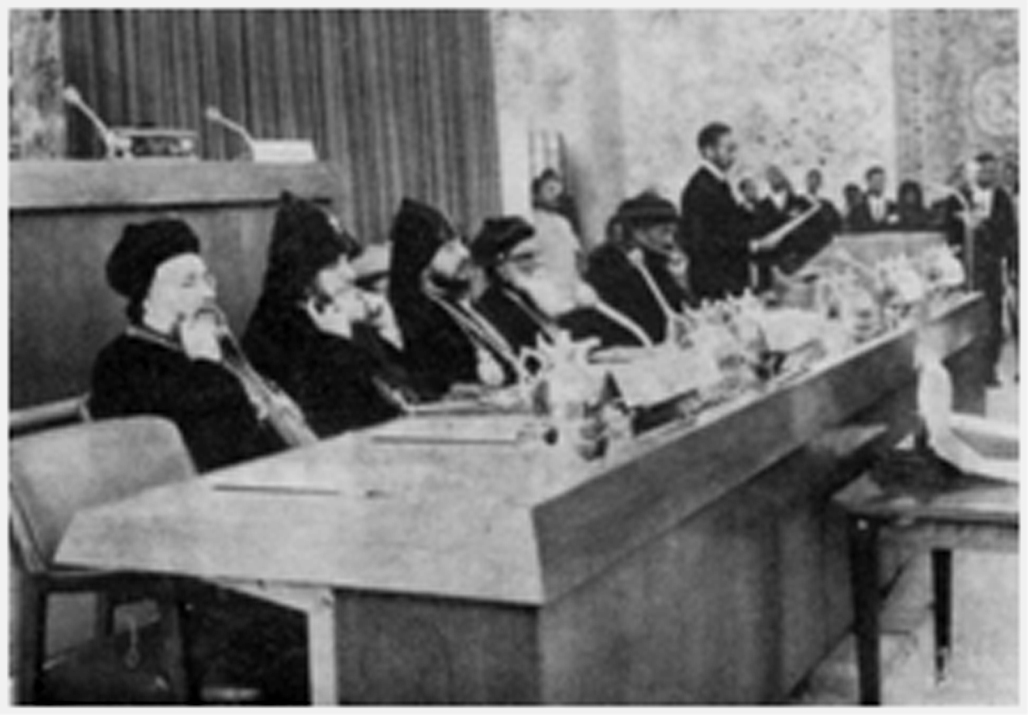
Welcome & opening Speech by HIM Haile Sellassie Ist.
11:00 am on the 15th January 1965
….. It is with the hope that your meeting will contribute in a significant way to the unity of the Church, and indirectly to the unity of all men, that We have invited Your Holinesses and Venerable Fathers to our capital city.
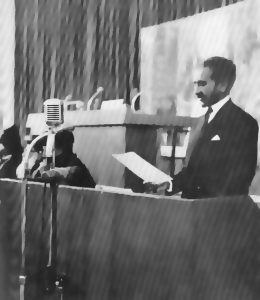 Venerable and Holy Fathers,
Venerable and Holy Fathers,
On this occasion when you Venerable Heads of the Oriental Orthodox Churches are assembled together in our capital city, it is appropriate to demonstrate our joy by singing with the Psalmist, “Behold, how good and how pleasant it is for brethren to dwell together in unity” (Ps. 133:1).
The Unity of the Church, as Your Holinesses well know it, is the will of God and ought to be an inspiring example to all men. It should always be a help and not a hindrance to the unity of men of different religions.
As church history testifies, the church fathers, from the Apostolic period up to the Third Council (4th century A.D.), did hold Councils to formulate the doctrines of the church and to draft rules of church administration.
It is with the hope that your meeting will contribute in a significant way to the unity of the Church, and indirectly to the unity of all men, that We have invited Your Holinesses and Venerable Fathers to our capital city.
Today not only the church, but also the political powers of the world are frequently meeting, leaving their differences aside, to tackle common problems, and find ways and means for the achievement and preservation of world peace. The church should not overlook this great task because she is the origin of peace and fraternity.
Our own Church is as ancient as our faith, and her history is replete with accounts of the unswerving faith of our people, the inspiring heroism of our martyrs, the Holiness of our saints. The history of our nation has always been closely related to the history of our Church, and the Church has been both the rallying point and the inspirer of our national unity.
Christianity has flourished in Our country, keeping its original features and character through the centuries. As a nation we have a great debt to the church for our cultural heritage.
Ethiopia has been from ancient times well known for her hospitality, and this is not the first time she has welcomed holy fathers like yourselves. From the 4th century A.D. onward monks and saints have come from Egypt, Syria and other Christian countries to Ethiopia and have been received with high honour and great respect. To mention only a few among those who are canonized in the Ethiopian church the Nine Saints who came from different countries of the Middle East and Abune Gebre-Menfus-Kidus are examples.
These holy fathers, preaching and establishing monasteries in various parts of Our country have greatly contributed to Ethiopian Christianity. Therefore, many churches and monasteries are dedicated to them in undying memory of the spiritual services which they rendered to our country.
Our Ancient Ties
 In ancient times, when the Faith of the whole Church was one, Our country had the closest relations with the Emperors of Christian Byzantium. At the time when several Christian peoples in the North became subservient to non- Christian powers, our country gladly provided asylum to thousands of Christian refugees. It had equally given asylum from religious persecution at an earlier date to the followers of the founder of Islam. Only when our own immediate neighbours ceased to be Christians did our contacts with our fellow-Christians in the North and East become difficult to maintain.
In ancient times, when the Faith of the whole Church was one, Our country had the closest relations with the Emperors of Christian Byzantium. At the time when several Christian peoples in the North became subservient to non- Christian powers, our country gladly provided asylum to thousands of Christian refugees. It had equally given asylum from religious persecution at an earlier date to the followers of the founder of Islam. Only when our own immediate neighbours ceased to be Christians did our contacts with our fellow-Christians in the North and East become difficult to maintain.
Ethiopia, an island of Christianity, has made her own distinctive contribution to the Christian faith; for, ever since her conversion to Christianity she has remained faithful, her age-old ties with the Apostolic church uninterrupted. For this reason she is universally renowned as the faithful daughter of St. Mark of Alexandria. The opportunity we have today to discuss our common interests and problems together is the fruit of that ancient unity. To defend the faith and to preserve our ancient ties with your respective countries, our fathers the Emperors of Ethiopia and the Ethiopian people have exerted great efforts all through our history. We are grateful to all of them.
It is therefore with great joy that We welcome Your Holinesses to Our land and to Our Church. Your Holinesses bring with you sacred memories from the ancient past. Your presence here is a pledge and token of the desire of all Christians to be one.
Ever since We ascended the historic throne of Ethiopia, We have considered it Our duty to call for a meeting of the churches who belong to the same fold. We were praying to God for His help in achieving this holy purpose, so that He may grant it to us to see this event. In ancient times the Byzantine emperors used to summon the councils. Our sincere wish from the very beginning was to see these churches meeting to discuss their common interests and decide on their common problems. This wish is in actual fact fulfilled today, and We are happy to witness it. Therefore, We thank Almighty God first because He has enabled Us to properly fulfil Our clear duty, and secondly, because Our long cherished desire has now met with fulfilment. Henceforth the matter will demand the spiritual unity and hard work of Your Holinesses. For strength can be achieved through unity, and success is the fruit of co-operation. There is no doubt that work done through a co-operative spirit shall meet with success. Christ affirmed:
“… That if two of you shall agree on earth as touching anything that they shall ask, it shall be done for them of my father which is in heaven.” (Math. 18:19).
Restore Contact
 For centuries past our Orthodox Churches have been without contact. Perhaps that which still divides the two groups is a matter of some importance. Perhaps it is not. In any case, we live in a time when even political differences are discussed around the conference table and peaceful and amicable solutions sought by all. The Church can afford to do no less.
For centuries past our Orthodox Churches have been without contact. Perhaps that which still divides the two groups is a matter of some importance. Perhaps it is not. In any case, we live in a time when even political differences are discussed around the conference table and peaceful and amicable solutions sought by all. The Church can afford to do no less.
Our age is characterized by notable advances in the sphere of communications, and is therefore rightly termed an age of unity and of coming together. In this connection We recall the noble efforts of Archbishop Nathan Soderblom of Sweden who took the initiative for the “Universal Christian Conference” which met in Stockholm as long ago as 1925.
We have also followed with keen interest the deliberations of the Ecumenical Council held last November in Vatican City under the spiritual leadership of Pope Paul the Sixth of Rome.
This Conference may not be able to come to final conclusions here and now. Yet it behoves the leaders of the Churches to begin to seek ways and means of reconciliation and collaboration.
Seek Unity, Peace
 As noted in your agenda, you are to consider the problem of peace, because the world today is facing a great dilemma: the catastrophical weapons which are the result of human ingenuity, menace the world to the point of annihilation, and the human race is more than ever in need of the prayers and support of the Church.
As noted in your agenda, you are to consider the problem of peace, because the world today is facing a great dilemma: the catastrophical weapons which are the result of human ingenuity, menace the world to the point of annihilation, and the human race is more than ever in need of the prayers and support of the Church.
In this fact we have another ground for co-operation with all the Churches of the world. As the followers of Christ let us not forget how often our cause has suffered through disunity.
We would like to refer in conclusion to the question of social welfare in the modem world. For a country can achieve much more in this field if supported by the church. The will of God will be realized and humanity can achieve progress in both the spiritual and material fields in a healthy society.
We consider it a great blessing to us and to Our people that Your Holinesses have come to bless our land with your sacred presence. Our people and Our Church rejoice to welcome Your Holinesses in our midst.
Holy Fathers, descendants of the Apostles of Christ you have an eminent responsibility, which responsibility would include the improvement of the relations of laity with clergy and of church with society.
We hope and trust that God will guide the discussions here according to His will and that His power will assist Your Holinesses in finding common solutions to common problems in the spirit of amity and concord. May God who helped the 318 Fathers of the council of Nicea enlighten and help us all.
The Conference Opening Speeches
The Conference opening speech by Ethiopian Representatives & Reply
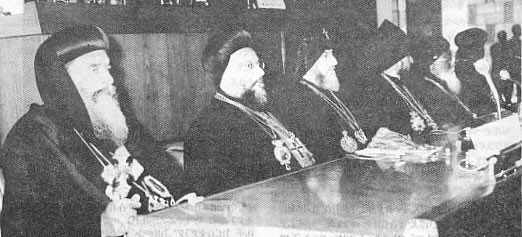
The Welcome Speech
THE WELCOME SPEECH WAS DELIVERED BY A REPRESENTATIVE OF THE ETHIOPIAN ORTHODOX CHURCH TO THE PARTICIPATS OF THE PRE- CONFERENCE CONSULTATION
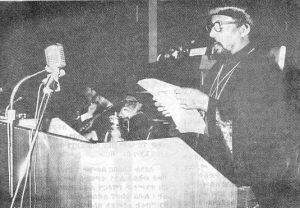 Esteemed Fathers and revered Brothers
Esteemed Fathers and revered Brothers
We in Ethiopia are indeed delighted that you are with us and that we join with you in service for the next few days. So let me, on behalf of the Ethiopia Orthodox Church, His Imperial Majesty’s Government and of my own, take this opportunity to extend to you our warmest and most sincere welcome to our Church and country. You are responsible leaders and theologians of some of the most ancient and renewed Churches in the world and you have come to Ethiopia as the officially chosen delegates of your own respective communities. So we consider it an honor to welcome you and a great privilege to entertain you.
You have come to Ethiopia to perform a glorious piece of work, and it is quite fitting that it has been so arranged that you will begin it on these days of the Feast of Christmas. Our lord Jesus Christ was born more than nineteen centuries ago in that lowly manger in Bethlehem. He came into the world to bring peace on earth by uniting man with God and man with man. He lived on earth and died on the cross. But He rose again from the dead and is present with us to lead us in the way of peace.
On these blessed days you have come together to work under His leadership and guided by the Holy Spirit to lay the foundation of a renewed spirit to lay the foundation of a renewed spirit of forward movement in our Churches, a movement which should contribute to growth and enable all those who are called by the name Christian to drew closer together and express the fullness of unity, for which our Lord earnestly prayed. We know that this is a very great task, but we hope that God will guide you to make a good start towards its fulfillment. The conference of the Heads of our Churches, which is to follow your consultation, will rely on your labors for their decisions. So the success of the Conference will depend upon what you will be doing during these few days. Our earnest support in prayer goes with you, and we believe that God who has brought you here will be with you guiding you in all your thinking and activities.
We trust that you will enjoy your stay with us. Once again let me assure you that you are most welcome in Ethiopia, and that you may count on us that we will do our best to make you happy and comfortable in every way possible.
REPLY OF H. MORAN MAR IGNATIUS YACUB III
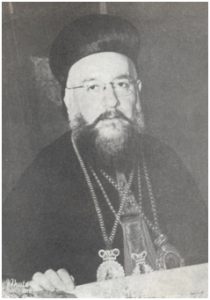
Your Imperial Majesty, Holy Fathers and Brothers beloved clergy and people.
It is with deep sense of gratitude to Almighty God that we stand here on this occasion, and the joy which we feel in the depths of our hearts is beyond words to describe. Your Majesty has offered us a memorable opportunity to meet in your beautiful capital. While listening to the speech of your Majesty, we are reminded of the episode at the Council of Nicea in 325, when following the inaugural oration of Emperor Constantine, St. Eustathius of Antioch delivered an address praising the Emperor. Although we consider ourselves unworthy to take the place of that illustrious soul, as a successor of his on the holy see of the Apostle Peter we deep it our most pleasant privilege to speak these few words following your Majesty. In calling this historic Conference, your Majesty has shown yourself a worthy successor of the faithful Emperors in Christian history who have served the cause of the Church in their respective generations. While thanking your Majesty for convening this Conference, may we express our most sincere gratitude to the government and people of Ethiopia as well as to the Ethiopia Orthodox Church.
As the meeting of Heads and leaders of our sister Orthodox Churches of the East, this Conference is a great event for our Churches. Through we have a common heritage of Orthodox faith, our Churches have not had an opportunity of meeting together in this way for many long centuries. But now God has, through his servant Haile Sellassie I, the Lion of Juda and the glorious Emperor of Ethiopia, made it possible for us to come together. In fact, from the time when our humble self was elevated to the holy see of the Apostle peter, we have been praying God to open the way for a meeting of our Churches, and when two of our brother Metropolitans visited Ethiopia soon after our installation, we had sent through them an appeal to your Majesty urging you to convene it. Now your Majesty has, out of your own gracious decision, called this Conference and we of the Syrian Orthodox Church all over the world rejoices in it.
It is fitting on this occasion for me to say that as the ruler of Ethiopia your Majesty is a person whom we hold in the highest esteem. We remember you always in the celebration of our Liturgy. In so doing, we follow the worthy instruction of our distinguished Fathers like Mar Dionysius Bar Salibi in the twelfth. They have enjoined on us that we should remember the kings of Ethiopia in our Eucharistic Service, as they share the same faith with us. Even our Churches have very close relationship with each other at least from the forth century. So we have record that St. Frumentius who was the first Archbishop of Ethiopia had come from Tyre within the province of our see. Mar Jacob Baradaeus in the sixth century visited Ethiopia, and that about the same time the Nine Saints settled down in this country leaving their home in Syria. We are indeed happy that we are able to visit this great land, its Church and people.
Our Churches have indeed inherited the Orthodox faith from our Fathers. But we have not always manifested its meaning through the redeeming powers of divine love to a world which is hungry for it. That is one reason why our Churches have not been able to make the Gospel of Christ more real to our non-Christian neighbors. Through this conference we shall not only strengthen the bond of unity which exists among us, but shall also seek to re-examine the ways in which our true faith should transform our people. Besides, we shall agree together on practical programs of common action to make our Christian witness more effective in the world. With these concerns in mind, we pray that Almighty God may so order our deliberations that our Conference may give a new start to our ancient Churches.
To you Imperial Majesty and to the people of Ethiopia, especially to our brethren in the Ethiopian Orthodox Church, we and our Bishops bring the warmest regards of the Syrian Orthodox Church all over the world. We have with us in this conference our exalted Brother, Mar Baselios Augen I, the Catholicos of the East, leading a delegation of his ancient Church in India. It gives us great joy to see that in spite of his old age our beloved brother has journeyed from far-off India to Ethiopia to take part in this Conference. May we convey to Your Majesty, the church and people of Ethiopia the warmest greetings also of the Syrian Orthodox Church of India.
1st Session: Church & Modern World
The topics discussed, the debate, conclusions and council proclamations
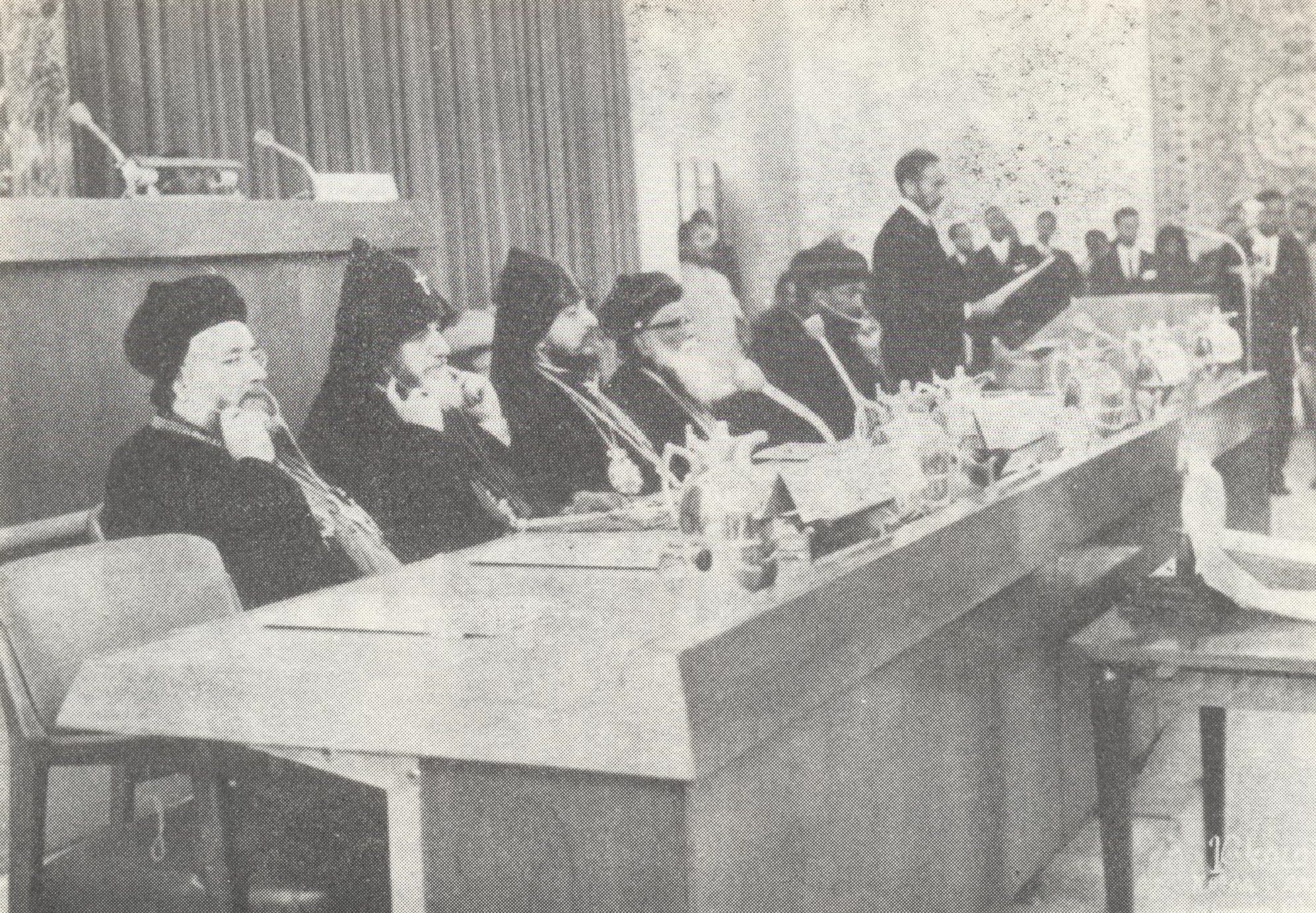
Photo of Session 1
The Introduction
The world in which we live has undergone, and is continuously undergoing, radical changes which deeply affect the life of the people. Men and women are acquiring new ideas, are attracted to new ideologies, are experiencing new ways of life and are creating new norms of culture. A whole secular movement is sweeping over our people almost everywhere. We all are aware of the widening gap between the Church and the educated modern man, particularly the youth. We realise that the question of how to bridge this cleavage is a major problem, and we decide to take seriously the following suggestions presented to us by the Committee of theologians.
Concerning the problems raised in the minds of the faithful in this 20th century by new points of view, spiritual, doctrinal and exegetical, or new materialistic and atheistic ideologies, the Conference of the Oriental Orthodox Churches re-affirms its attachment to the orthodox faith and doctrine based on the Holy Bible and the Holy Tradition. In particular, new theories or declarations, whether made by individuals or by groups, concerning the life and teaching or our Lord Jesus Christ. His Incarnation or His Crucifixion must be judged on the basis of the text of the Holy Bible and the teachings of the Fathers of the Church. “Knowing this first, that no prophecy of the Scriptures is of any private interpretation. For the prophecy came not in old time by the will of man, but holy men of God spoke as they were moved by the Holy Ghost.” (II Peter 1: 20’21).
“All Scripture is given by the inspiration of God and is profitable for doctrine, for reproof, for correction, for instruction in righteousness. That the man of God may be perfect. Thoroughly furnished unto all good works.” (II Tim. 3: 16-17). Each of our Churches will appoint a Committee to study the details of the problems raised by such new points of view and ideologies, to formulate the answers required and to report their findings to the Standing Committee for further consideration in a forthcoming Conference.
Youth, our responsibility
A considerable proportion of educated youth seems to be drifting away from active participation in the life of the Church. This is especially noticeable in the unwillingness of most college and university educated young men to consider priesthood as a possible vocation for them. It is not unusual to find the very young men who are reluctant to come in touch with the Church becoming enthusiastic workers in certain groups of ideological or social character which succeed in capturing their imagination and loyalty. One of the reasons for this seems to be that they feel the Church continues to live in a bygone age, being concerned with questions of doctrinal history rather than paying attention to problems that are more real to the modern man. The churches are reckoned by them as being preoccupied mainly with keeping the “deposit of faith once delivered to the Saints” and carrying on the accustomed patterns of worship. In other terms, the preaching and the practice of the Church are less meaningful to many educated men in a scientific and technological age.
Integration of Church with Modern Man
Therefore, there is an urgent need for the reintegration of modern men in general and educated youth in particular, with the life of the Church. The needs of those who live in urban and industrial areas should be given special consideration. Our churches should immediately take up for serious consideration questions such as those of making appropriate changes in certain practices which have a direct link with the participation of the people in the life of the Church. For example, the rules of fasting and the days of lent need to be reconsidered and revised. The genuine spiritual values of such practices should be taught to the faithful so that they may enter into them meaningfully. The length language and hours of church services should be re-examined, applying methods of simplification and adaptation, without bringing harm to the mystery and deep spirituality contained and made manifest therein. Laymen and laywomen must be brought into responsible positions and places in the life of the Church. Particularly the youth must be given more responsibility in their participation in the life and work of our churches. Youth must not be regarded and dealt with, as a group at the fringes of the Church, but must be brought into the very heart of the life of the Church. Since these points are most indispensable for the integration of modern man with the life of the Church, we resolve that each of our churches should appoint an expert committee to study them in its own particular context and to recommend specific measures for adoption by it, and that whatever steps to be thus taken by each may be brought to the information of the other churches. In this connection we note that the Syrian Orthodox Church both of Antioch and of India as well as the Armenian Orthodox Church have already introduced certain definite changes in their rules concerning fasting and Lenten seasons.
Family Life & Spiritual Renewal
Christian homes are the basic units in the life of the Church and there is urgent need to provide education in Christian family life. Special attention must be given to the instruction of young couples before and after marriage. The question of family planning, dissolution of marriages, and related problems should be carefully studied and cared for in a deep pastoral concern.
The practice of Bible reading, daily devotions, family prayer, regular attendance at Church services, frequent and well directed confession and conscious participation in the Holy Eucharist must be encouraged by every possible means. Sacramental life should be strengthened and depended. It should become more directly related to the social concern for the poor and the suffering. The spiritual gifts received through the grace of God must be translated into actions of charity and sacrificial giving for the welfare of the needy and the promotion of social justice. The confessional should once again become a real and effective source of spiritual and moral guidance and counselling. All this calls for a new orientation in the pastoral ministry of our churches.
Christian Education
The Christian education of our children and young people is a matter of genuine interest and concern for our churches. We decide to establish a special Committee composed of experts, namely educators, clergymen and laymen, to prepare a general outline of a curriculum for Christian education to be used by our churches with necessary modifications required by the particular traditions and situations in each church.
Literature has been in service to the Christian Church since the very beginnings of Christianity. We have received from our Church Fathers a very rich literary heritage in the fields of biblical, theological, hagiographical. Liturgical, and historical studies and writings. But we can not confine ourselves to what we have inherited from the past and have it as the only source for our spiritual nourishment. The literary activity of churches should be a continuous process which may bring new and fresh spirit into the life of our churches.
We need:
- Biblical and Liturgical commentaries;
- Theological Books for a clear and intelligent exposition of our Christian faith;
- Literary productions aimed at meeting the challenge of modern ideologies, sociological theories, and new psychological trends in relation to the teachings of the Gospel;
- Popular Christian Books such as novels and tracts, written in an attractive language and style for the ordinary people;
- Informative publications giving full and precise account of historical background and the present situation of our churches written in a form of fair, accurate presentation and in a spirit of self-criticism as over against self-glorification, as we are sometimes inclined to do;
- A periodical for all our Churches covering information concerning our various churches, selection from our local periodicals, and activities of our Committees and Secretariat.
Monastic Life
Monastic life has to be revived in our churches. While emphasis should continue to be placed on contemplation, manual labour and study in all monastic orders, it is necessary to develop different types of orders giving special attention to different concerns in view of an active participation in the work of our churches as a whole. Careful selection and proper training of candidates are the basic preconditions for a successful renewal of monastic life.
The restoration of Religious Orders for women should be carefully considered and seriously taken up. The Church will gain immensely from the devotion of such women who feel the call to dedicate their whole life to God’s service. Our churches should take seriously the question of exchanging monks and nuns between them.
Church Administration
Although the systems of church administration very to a very large extent from church to church, yet we feel that there is a need for re-examination and re-ordering. Two points must be given priority:
(i) Stress should be put on the pastoral nature and vocation of the Episcopal order. The bishops should have such an efficient administrative system as may enable them to exercise their pastoral care with more fruitful benefits to the spiritual flock entrusted to them.
(ii) A system should devised in which all sections of clergy and laity may be given responsible and well-co-ordinated share in the whole life and witness of the Church. A certain flexibility, as over against rigidity, must be allowed for proper adjustment and helpful adaptation in carrying out effectively the Church’s services in all walks of human life.
(iii) CHURCH CALENDAR
The question of whether there is not the need for a revision of our Church Calendar should be faced by our churches. A unified calendar would indeed be an outward expression of our oneness. So we decide to nominate a Committee of experts to study in detail the causes of differences and difficulties arising there from, and report to us their findings for consideration and appropriate action. We not that here also the Syrian Orthodox Church both of Antioch and of India as well as the Armenian Orthodox Church have accepted a change in its traditional calendar by adopting the Gregorian Calendar.
2nd Session: Cooperation in Theology
The topics discussed, the debate, conclusions and proclamations
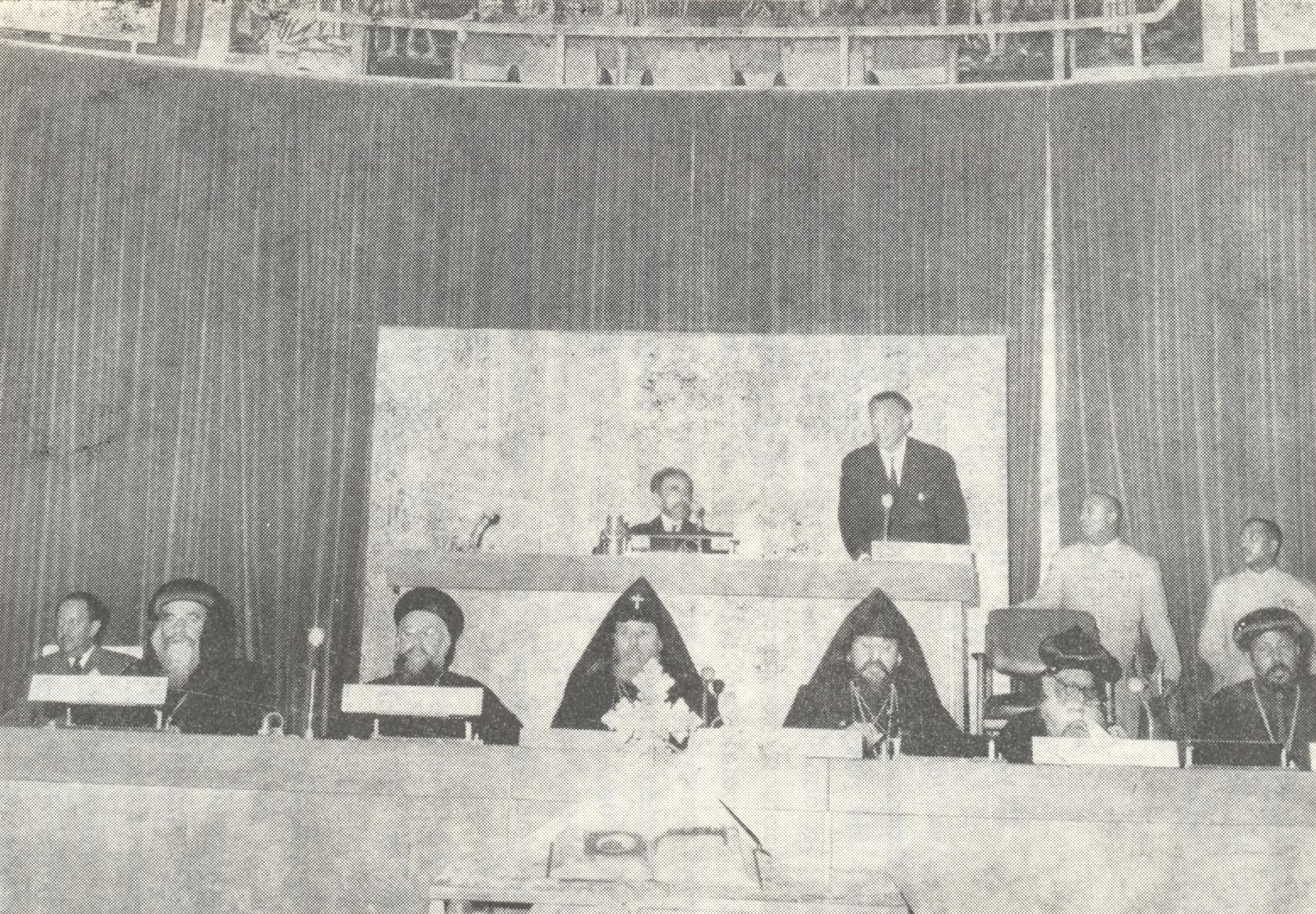
Photo of Session 2
Introduction
We all recognise that theological education is one of the most indispensable responsibilities of Church. The Church needs men who, on the one hand, are ready to respond to the call of the Holy Spirit at work in the Church and, on the other hand, are capable of meeting the needs of man in modern times. Theological education is the proper means by which the churches seek to prepare such men. Although the primary aim of theological education is the training of the clergy and of other church workers, it should also provide for the education of laymen to be effective witnesses of the Christian faith in their respective callings in life.
Content of Theological Education
By theological education, the Church tries to instruct the members in the first place, its clergy- in the faith in a way relevant to the realities of life in every age. The Church’s faith is centred around the Person and Work of Jesus Christ, the incarnate, crucified and risen Lord, and the continuing guidance of the Holy Spirit who brings a contemporary reality in every age Jesus Christ and His redeeming work. This faith is borne witness to in the Holy Scriptures and has moulded the Holy Tradition of the Church. So, in theological education, there should be an adequate place for the study of the Bible, which has brought fresh inspiration to every generation, and of Christian history as a dynamic experience of our common faith and God-given mission. All this should be undertaken in an atmosphere of worship and religious commitment and in relation to the intellectual element of our age. Thus by theological education, the Church should be able to train men who are deeply rooted and grounded in “the faith once delivered to the Saints” and who will proclaim it effectively to their generations.
While the spiritual and intellectual aspects are thus being emphasised, the pastoral aspects would not be overlooked. Thus, a programme of practical training in Christian action should also be part of any theological education. Students in Theological Schools should be given opportunities of coming in touch with the world as it exists and which will be the field of their action during their ministry. In addition to this, they should be provided with facilities for entering into the life and work of the parish through direct participation. Whereby they may become acquainted with the various aspects and problems of Church life.
Common Curriculum
Bearing all these facts in mind, we feel the need of drawing up a comprehensive curriculum for theological studies in our churches which might be adopted by each church with suitable modifications according to its particular traditions and local needs.
Practical Means of Cooperation
With reference to the specific question of co-operation in theological education by our churches, we realise that there are two problems which we have to face. In the first place, the fact that we use different languages as our media of instruction in our Theological Seminaries makes co-operation difficult to work out. Secondly, there is the problem that our churches do not have either the same liturgy or the same ecclesiastical practices. AT the same time we decide to explore possibilities of initiating the following means of co-operation.
We should encourage the exchange of special students, preferably at a graduate level, who will learn the needed language and will be offered by the institution concerned necessary facilities in carry out their chosen programme of study. Exchange of professors will be easier than the exchange of students, especially when they are scholars or experts in some field or study.
We should co-operate in the building up of a common Centre of Advanced Studies and Research as a place of higher learning for our churches. This should be a post graduate institution offering facilities for special study at a high level of scholarship in the history, theology and other subjects related to our Orthodox Churches. Post graduate students recommended by any of our Churches, should be admitted to it and professors of high academic standing or experts in their respective fields may be invited to join its staff. With a view to maintaining an advanced level of academic proficiency, it may work in co-operation with institutions of a similar nature in other parts of the world.
Studies Abroad
In view of the fact that there are facilities offered by Universities, Seminaries and other institutions abroad for advanced studies in theology, and that we also can take advantage of them, we resolve that our churches should select qualified persons and recommend them to places of our choice. In so doing, we should see that the men so sent are graduates in their own countries and mature enough to pursue their studies in a part of the world other than their own. They should be people deeply rooted in their own tradition, at the same time having a genuine in sight into other traditions.
Theological Books
Production of theological books and textbooks is also an area in which we decide our churches should co-operate. When the proposed Centre of Advance Theological Study and Research takes shape, this work also can be combined with it. The books so published may be translated into the various languages in use in our different churches, so that language will not be a hindrance for co-operation in this respect.
3rd Session: Cooperation & Evangelism
The topics discussed, the debate, conclusions and proclamations
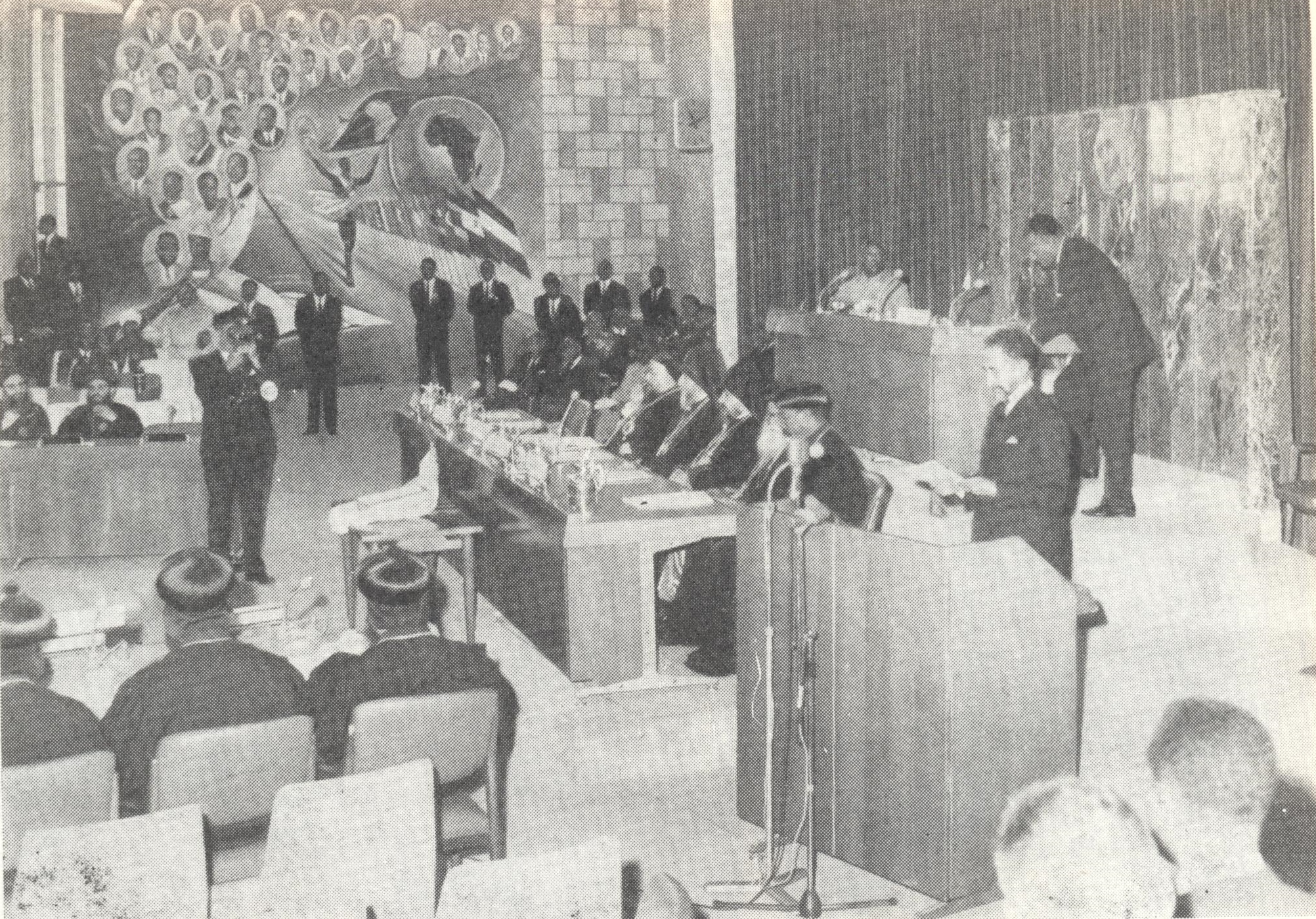
Photo of Session 3
Introduction
Evangelistic work is another area in which, we feel our churches should co-operate. Evangelism is part of our common heritage, and we recall the great accomplishments of our churches in the past in this field. At the same time we live in an age which calls for a fresh evaluation of the methods of evangelism. So we should examine the experiences of the various missionary organizations in our churches and see what can be done to co-ordinate our evangelistic efforts.
The Basis of Evangelism
The basis of evangelism is to be found in the very nature and purpose of Christ’s Incarnation as manifested in His life and teaching. It must not be the human desire to increase the number of members in one’s own community. Also, it is not a merely formal obedience to Christ’s command: “God into all the world and preach the Gospel”. In His high-Priestly Prayer, our Lord said to the Father: “ As thou didst send me into the world, so I have sent them into the world” (St. John 17: 18). Our Lord sent His disciples into the world even as His Father sent Him into the world, namely to identify Himself with humanity in all its misery, to bear its sin, to die on the Cross on its behalf. The Apostolate of the Church consists in representing the Master who” came not to be served but to serve, and to give His life as a ransom for many”. Therefore, the Church’s role is to convey the message of salvation to the world and to be the good Samaritan binding up the wounds of a broken world, trying to make God’s love real to those to whom it is not otherwise real. This is not just one of the many activities of the Church, but should be its central concern its main preoccupation.
We need well-trained and devoted preachers and workers in the field of the evangelistic witness of our churches. However, increased evangelistic effort is not only a matter of training larger number of eloquent preachers and sending them out into all the world with the necessary equipment. It is also a matter of the whole membership of the Church being moved by the redemptive love of God and being concerned to bring succour to those who are in spiritual and material need everywhere. The question, therefore, is what our churches can do to foster among our members this evangelistic spirit of burden-bearing, for the love of God and along with that, to organize the proclamation of the good news of God’s love to a world in need.
Worship & Evangelism
The life of the worshipping community is an essential witness of the Church to her risen Lord. Loving identification with, and redeeming lover for, mankind for whom our Lord died is expressed in worship through evangelistic intercession. Such intercession, Prayer for the world and for the Christian work which expresses the care of the Church, will also help to make the members of our churches more conscious of their Apostolic or missionary calling. We have to give this kind of evangelistic intercession an integral place in our liturgical worship and our family prayers. This needs enlarging the intercessory parts f our worship and introducing a programme for educating our congregations in this respect.
Evangelism & Strengthening Our Spiritual Life
Evangelism should make our churches better instruments of the Holy Spirit in all aspects of their life. This is the real source of renewal of our churches. Evangelism involves an earnest attempt to make the compassion of Christ a reality to those in need. This calls for not only sympathy expressed through almsgiving, but also for sacrificial giving of whatever God has blessed us with. Our people should be taught the principle and practical ways of self-giving through personal commitment. There are de-christianized areas in the lives of our people which need to be evangelized. Here there is a need to make the fullest use of all the means of grace.
Evangelism Among Those Outside
We have to give united thought to specific areas where evangelistic work is urgently needed. Areas where men and women are in special needs of the Gospel message of a new life, ought to engage our immediate attention. The message of the Gospel has to be presented also to those who are attracted by atheism, materialism, and other philosophies and ideologies so that the truth of Christ may be clearly and honestly faced by them.
In this connection it should be specially remembered that witnessing for Christ is not passing on our national cultures to men and women of other nations. Those who come to Christ are to be helped to continue as witnesses to Christ among their own people. This might involve the development of new modes of worship in accordance with their own environment, so that indigenous churches may be formed.
Method of Evangelism
There is need to study various methods of evangelism which have been, and are being, used to make Christ real to those in need. We must avoid such methods as are not compatible with the Christian sprit of charity and the moral ideals of evangelism. Our churches should use also modern media of communication and education like popular literature, the cinema, and the radio wherever possible, to proclaim the Gospel.
Training in Evangelistic Work
While all Christians are to be evangelists wherever they are, there is particular need for many who are engaged in full time evangelistic work. Such people need special training. Our churches, wherever possible, ought to have missionary training centers to give such training to full time evangelists and others. It would be of very great help if we would build up one Missionary Institute for all our churches together.
4th Session: Relations with other Churces
The topics discussed, the debate, conclusions and proclamations
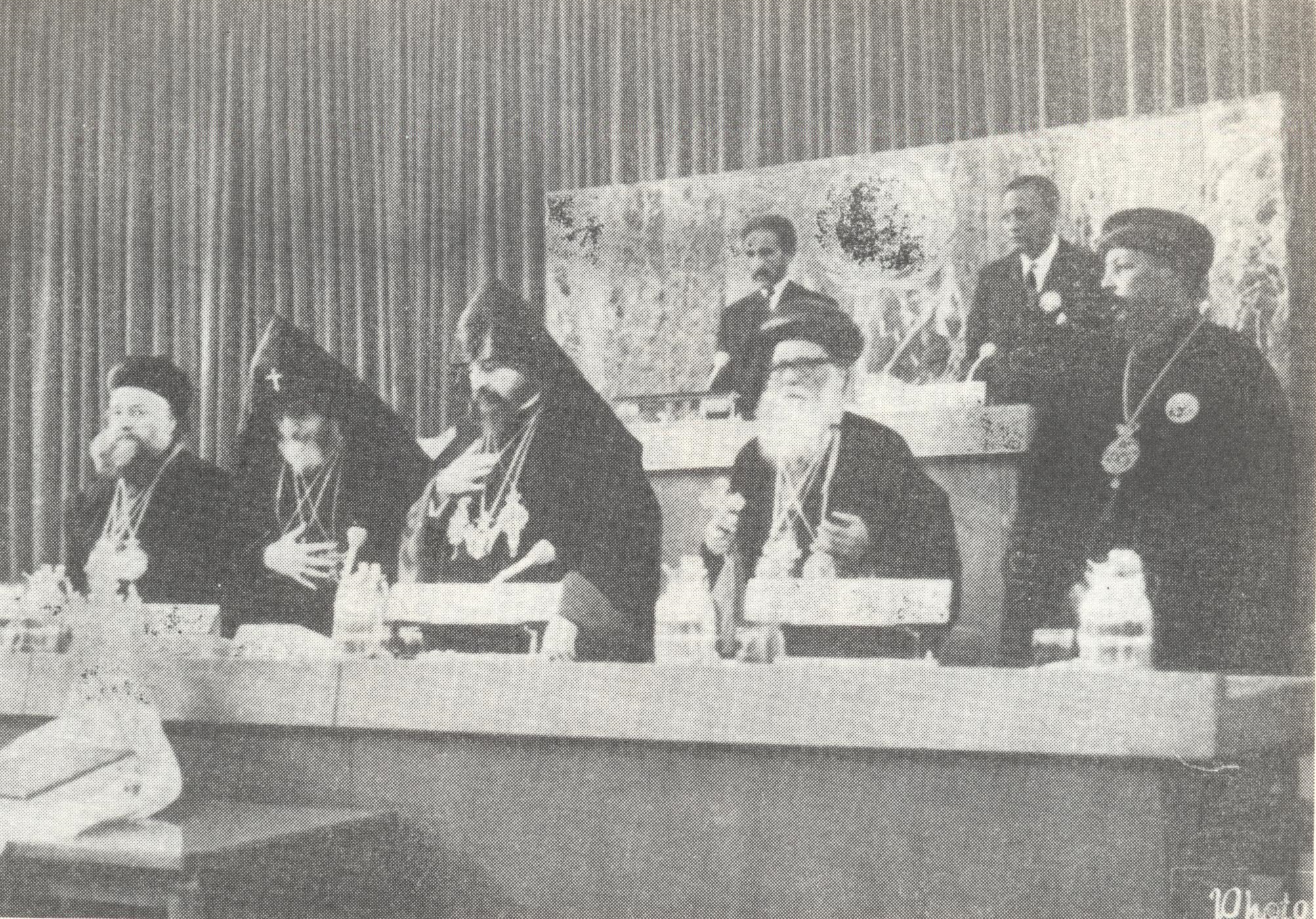
Photo of session 4
Introduction
We rejoice that there is a great longing for the recovery of Christian unity all over the world in our times, and we share that spirit fully. God wills the unity of the whole human race in His own Church. But the Christian world is divided into many bodies, a fact which causes much distress to us. So we are concerned to raise the question of what should be our relation with the many churches which comprise the Christian world. These churches can be considered under three categories. The Eastern Orthodox Churches, the Roman Catholic Church, and the non-Orthodox member Churches of the World Council of Churches.
Relations with Eastern Orthodox Churches
Though in our concern for the reunion of Christendom we have in our minds the reunion of all churches, from the point of view of closer affinity in faith and spiritual kinship with us we need to develop different approaches in our relationship with them. This consideration leads us to take up the question of our relation with the Eastern Orthodox Churches as a first step. We shared the same faith and communion till the Council of Chalcedony in 451, and then the division took place.
Concerning the Christological controversy which caused the division, we hope that common studies in a spirit of mutual understanding can shed light on our understanding of each other’s positions. So we decide that we should institute formally a fresh study of the Christological doctrine in its historical setting to be undertaken by our scholars, talking into account the earlier studies on this subject as well as the informal consultations held in connection with the meetings of the world Council of Churches. Mean- while, we express our agreement that our churches could seek closer relationship and co-operate with the Eastern Orthodox Churches in practical affairs.
Relations with Roman Catholic Church
With the Church of Rome also we shared the same faith and communion till the Council of Chalcedony in 451, and then the division took place. We rejoice about the new awareness which the Roman Catholic Church has begun to show of the need on its part of recognizing the other churches, particularly the Orthodox Churches of the East. With this new spirit in view, we suggest that we should be willing to enter into conversation with the Roman Catholic Church with a view to closer understanding. In our relationship with it the principle of dialogue on the level of Churches must be adopted. In this connection, we should ask the Roman Catholic Church to reconsider its theory and practice both of maintaining unite churches and of proselytizing among members of our churches.
We are happy to note that the Eastern Orthodox Churches have also expressed a positive attitude in regard to establishing a dialogue with the Roman Catholic Church, and we hope that it will be possible for our churches to proceed in this direction in collaboration with them.
Relations with other Member of WCC
With the non-Orthodox member Churches of the World Council of Churches, we have cordial relations through and we hope and pray that God will open the way for our mutual understanding and co-operation wherever possible. Of these Churches, the Old Catholic Church and the Anglican Churches must be considered in a special way. The Anglican churches, for instance, have always shown appreciation for the Orthodox Churches of the East, and we trust that this will lead to a fruitful dialogue between them and our churches. Our churches have also been in contact with the other member churches of the World Council of Churches. In our mutual relationship there have been, and still there exist, difficulties which arise from certain attempts at proselytism made by some of the Protestant Churches. WE hope that such attempts will cease. We believe that God who has brought our churches and the other member churches of the World Council of Churches together into friendly relations through that Council, will help us to grow in fellowship with one another and restore us all into the fullness of unity to His own time and in the manner He ordains.
The Ecumenical Movement
Before we conclude, we would like to express a genuine appreciation of the whole Ecumenical Movement such as that made manifest through the World Council of Churches. The new spirit of fellowship, mutual understanding, and cooperation fostered by the Ecumenical Movement has had beneficial effects in the life of all the churches involved.
We hope and pray that God will strengthen every effort made for the progress of the Ecumenical Movement to enable the churches to fulfil their mission through common and concerted efforts in ever greater faithfulness to our common Lord, Jesus Christ.
5th Session: Our Permanent Relations
The topics discussed, the debate, conclusions and proclamations
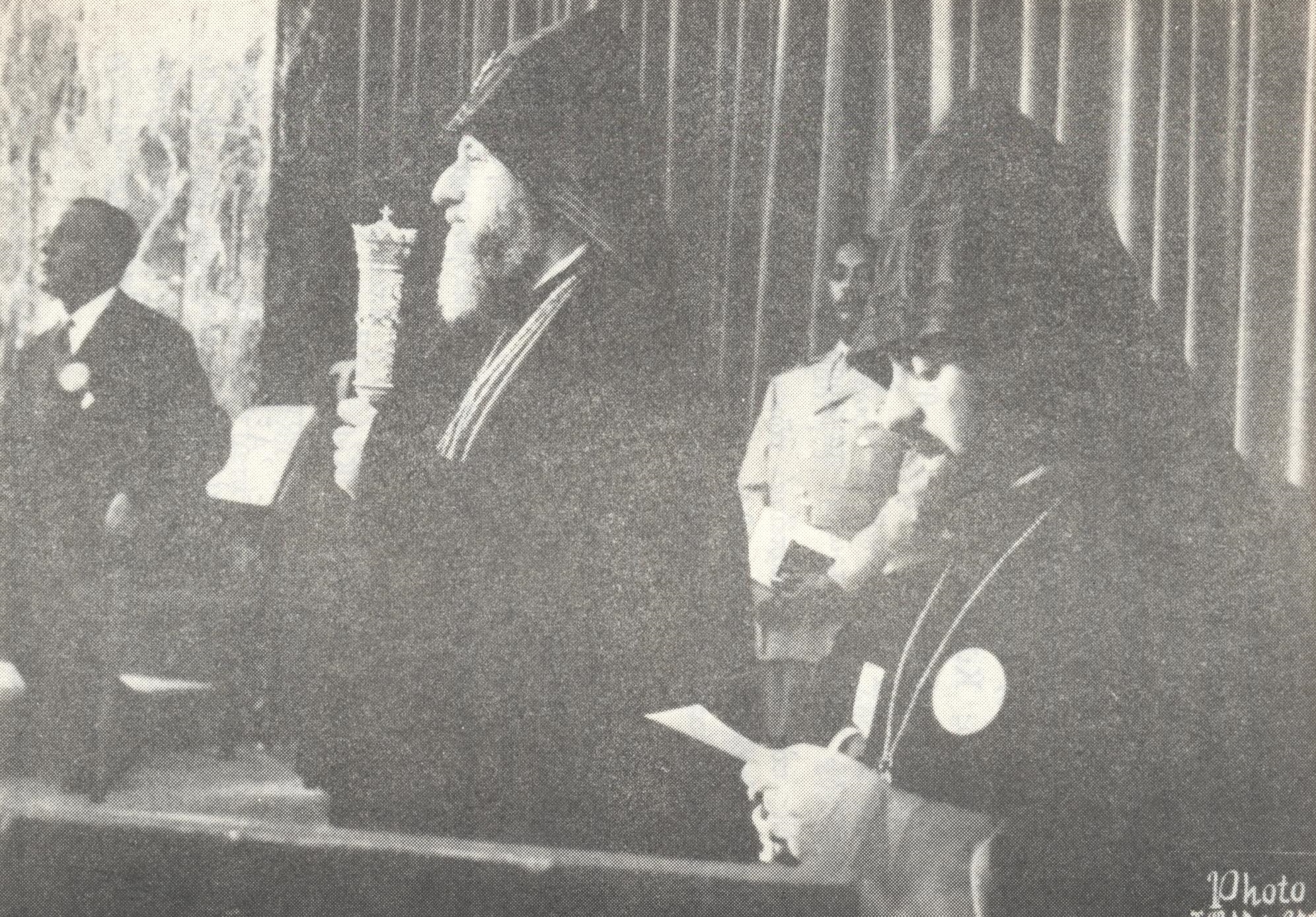
Photo of Session 5
Instituting A Machinery for the Maintenance of Permanent Relations Among Our Churches
In order to carry out the decisions of this Conference and to co-ordinate the efforts made by the various Churches in this respect, we resolve that permanent machinery should be established. So we appoint a Standing Committee consisting of two representatives recommended by each Church, who will have the following duties:-
(a) To follow up the work of this Conference:
(b) To arrange for the appointment of special Committees to study the questions referred to in the resolutions of this Conference;
(c) To study in detail, proper & efficient ways & means for the establishment of a permanent Organization & Secretariat for our Churches.
The members of the Standing Committee this appointed are:-
Alexandria – Anba Samuel & Anba Athanasius
Antioch – His Eminence Mar Malatius Barnaba &His Eminence Mar Severius Zakka
Ethiopia – Melake Selam, Samuel Terrefe, Dr. Getachew Haile
India– The Revd. Dr. K.C. Joseph & The Revd. Dr. V.C. Samuel
For the interim period between this Conference and the establishment of the permanent Organization and Secretariat, which should not exceed six months, we approve the appointment of Ato Seifu Metaferia as a temporary Secretary, his name having been submitted to this Conference by our sister Ethiopian Orthodox Church in response to our request, to carry out the practical work involved in this immediate stage. The Standing Committee in its first meeting should define the responsibilities of the interim Secretary and draw up the plan of work for this interim period.
6th Session: A Proclamation of Peace
The Assemble Oriental Primates & Delegates Declaration of Peace
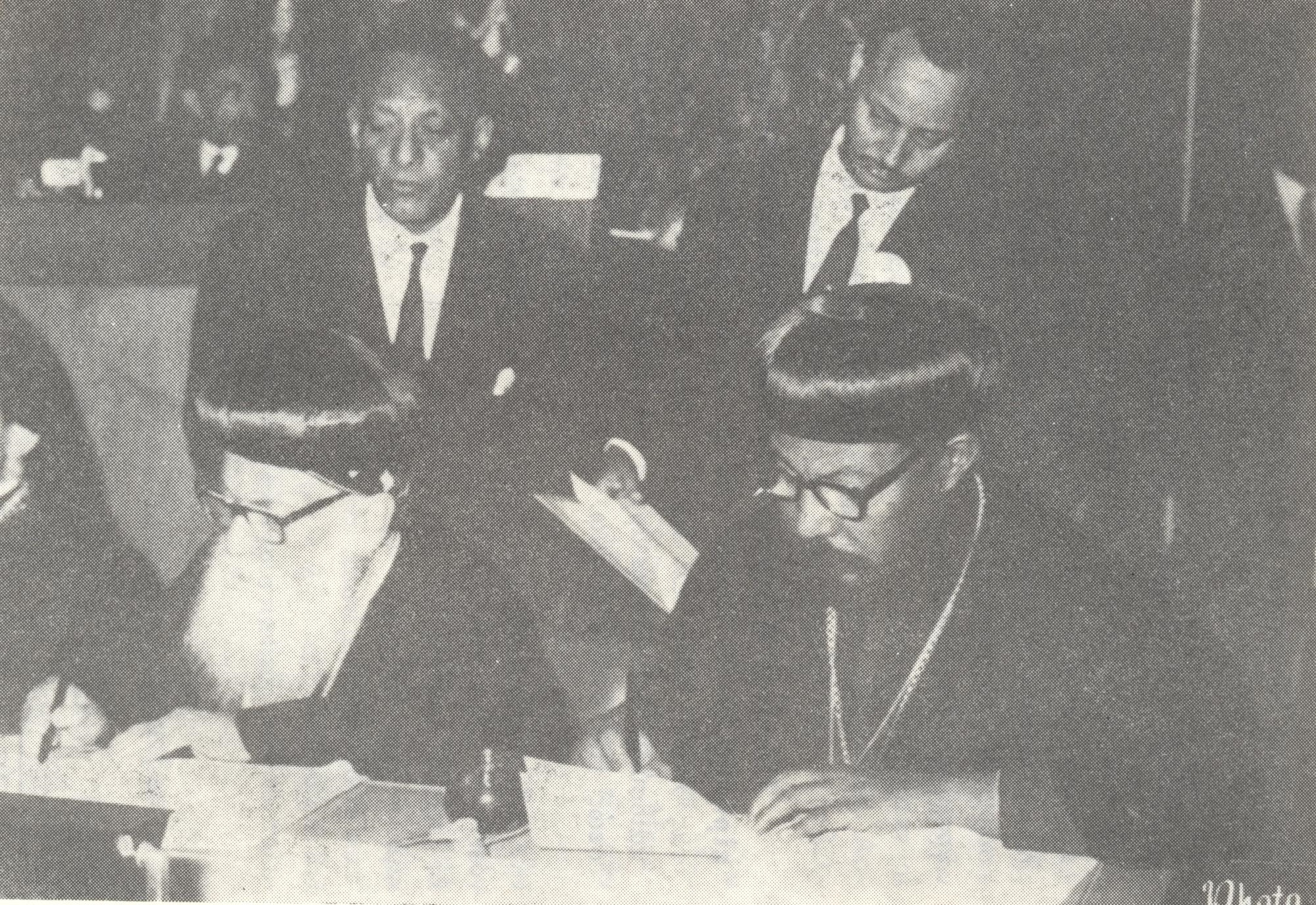
Photo of Session 6
The Conference Statement for Peace & Justice in the World
The Heads and Representatives of the Oriental Orthodox Churches, assembled in Conference in Addis Ababa during January 1955, wish to give expression to their deep longing to see Justice and Peace established for all peoples and nations in the world. Our Lord and Saviour Jesus Christ, the Prince of Peace, wills “peace on earth and good will towards all men”. But the world in our times is constantly troubled by the threat and fear of war. In this atomic age, any war can result in the destruction of the whole of civilization and even the worldwide annihilation of human life. Everything possible must be done to prevent the outbreak of war in any part of the world.
Peace, however, is not merely the absence of war. It is rather that state of life in which all the people and nations of the world move forward in harmony and co-operation towers the experience of God’s Kingdom on earth. In such a state of human life the rights of individuals, communities and nations must be fully recognized. All men are equal in the eyes of God. All are children of the one heavenly Father. The blessings of God in nature are for all human beings without distinction of race, religion, colour, class or sex.
Therefore, all human beings, communicates, peoples and nations must be treated on the basis of freedom of conscience, equality and justice. Our churches are committed by obedience to our Lord, to work for the establishment of justice for all. We would co-operate with one another and with world organizations which strive for the establishment of justice and peace in the world and we call on all peoples, nations and states of the world to do the same.
May God bless and prosper all efforts to this end by whomever undertaken.
Coptic Orthodox Church (singed)
Syrian Orthodox Church (signed)
Armenian Orthodox Church
Ethiopian Orthodox Church (signed)
Syrian Orthodox Church of India

7th Session: The Conference Resolution’s
The Assemble Oriental Churches, Council Resolutions & Declarations
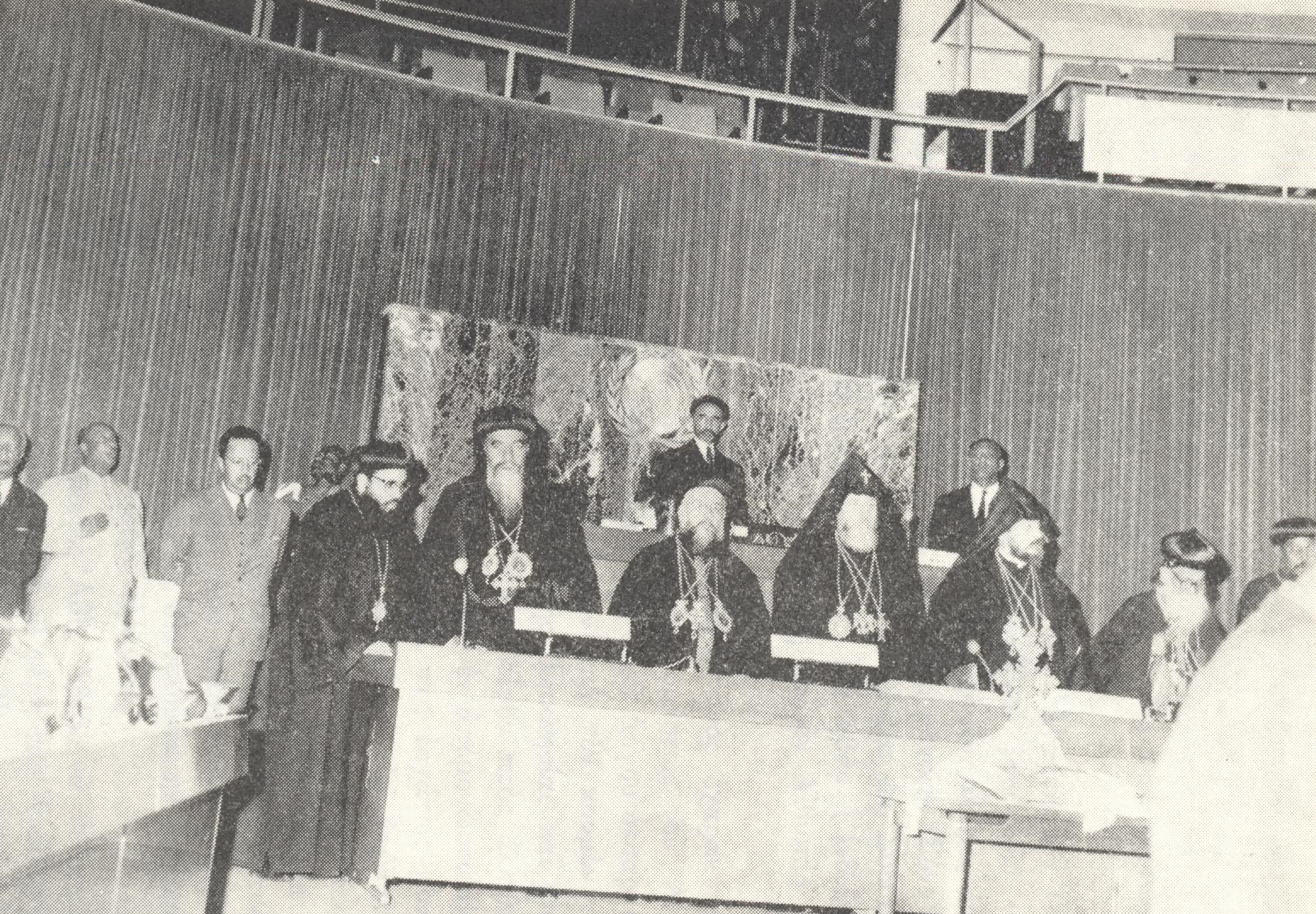
Photo of Session 7
THE RESOLUTION’S
(I)
The Defender of the Faith
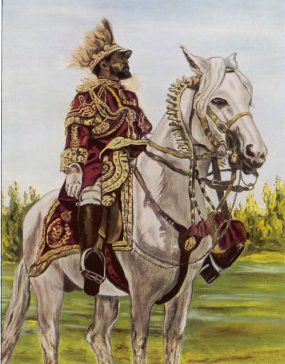
We, the Heads of the Oriental Orthodox Churches, assembled with our delegations in the conference, solemnly declare His Imperial Majesty Haile Sellassie I Emperor of Ethiopia as the “Defender of the Faith.”
(II)
We, the Heads of the Oriental Orthodox Churches, assembled with our Delegations in Conference, at the successful conclusion of our sessions, are happy to pay tribute to His Imperial Majesty Haile Sellassie I, whose initiative and foresight made this meeting possible.
In this His Imperial Majesty follows the tradition of other great and inspired rulers who have played their appointed part in Christendom and have deserved the title of Defenders of the Faith.
The conference expresses its gratitude to His Imperial Majesty and to the Ethiopian Orthodox Church for the work and efforts which have gone into the arrangements for this Conference. It thanks the Secretariat with its Head, the distinguished Secretary General, for the excellent arrangements at this Conference.
The members of the Conference have been extremely happy to visit the beautiful land of Ethiopia and to know its faithful and devoted people.
We raise our thanks to Almighty God for this meeting in love and brotherhood. We are confident that, with the blessing of Divine Providence, this meeting will be followed by others which will enlarge and strengthen the foundations so happily laid, for the good of our Churches and of Christendom.
(III)
We, the Heads of the Oriental Orthodox Churches, assembled with our Delegation in Conference, wish to express our deep feelings of gratitude and appreciation for all those who have shared in helping the initiative of His Imperial Majesty to come into existence.
To those who have carried the burden of long preparation through correspondence and delegations who visited our churches more than once. To those who arranged the facilities to make our stay so happy and pleasant.
Special tribute is rendered to the silent workers, the Ethiopian theologians and young people who worked in the translation, clerical work, transportation and all Secretariat, under the wise guidance and patience of the Secretary General, Ato Abebe Retta.
We thank the Clergy including the Debtera (singers) in the Churches in which we worshipped together. We appreciate the hard work of the two lady secretaries who came especially from Geneva to help us in recording the minutes. We also extend our gratitude to the World Council of Churches who graciously made them available to us.
Closing Speeches: The Conclusion
The Concluding Closing Conference Speeches & Tributes

CONCLUDING SPEECH OF HIS IMPERIAL MAJESTY TO THE CONFERENCE OF HEADS OF ORIENTAL ORTHODOX CHURCHES
Venerable and Holy Fathers,
 In listening to the profound spiritual message conveyed by your closing addresses and appreciating the happy outcome of your sustained efforts, our heart has been touched by profound gladness. It should, therefore be clear to the whole world from the result of your work that your Holiness have guided and inspired by the Holy Spirit to accomplish your task in love and unity.
In listening to the profound spiritual message conveyed by your closing addresses and appreciating the happy outcome of your sustained efforts, our heart has been touched by profound gladness. It should, therefore be clear to the whole world from the result of your work that your Holiness have guided and inspired by the Holy Spirit to accomplish your task in love and unity.
The great common tasks accomplished by this Conference in unison bestowed on the true faith and true order of the Oriental Orthodox Church the admiration of the whole world.
As Solomon says, physical distance can not be a barrier to love. Likewise, the distances among your respective countries have been abolished by proximity of your hearts. You have thus been able to speak with a single tongue and think with a single mind. We thank Almighty God for enabling us to witness the realization of our dream in the successful outcome of this historical Conference.
We are therefore happy to express to you our readiness, fortified by the results of this Conference, to invite you and the Eastern Orthodox Churches, and also other churches at the late date. We ardently hope that we shall meet once again in the not distance future.
As we stated at the inauguration of this Conference, to meet together, to take council with one another, and to act in mutual cooperation, has proved a most fruitful method both in the secular and spiritual fields. Henceforth the way is open for you to follow this fruitful path and to this end, our help and assistance will always be forthcoming since we support your efforts and ideas out of an unshakable conviction that it is our spiritual duty to do so.
We are gratified in particular to note that the work of this Conference has been concerned purely with religious spiritual matters, free from extraneous political considerations. This is only fitting and proper, for the church, as a symbol of peace, must follow the path of peace in all parts of the world. In this connection we are glad to note that our evangelistic mission in the world has received due emphasis in your deliberations, together with the recognition of the Christian duty to pray for the rights o man and peace in the world. For world peace can only be made abiding by the grace of God, through the prayer of the Holy Fathers. The truth of this cardinal fact is evident to all mankind.
We ardently hope that Almighty God shall bless the implementation of your important resolutions and decisions, just as He made possible the successful convening and conclusion of this historic Conference.
REPLY OF H.H. KYRILLOS VI POPE OF ALEXANDRIA AND PATRIARCH OF THE SEE OF ST. MARK
Your Imperial Majesty,
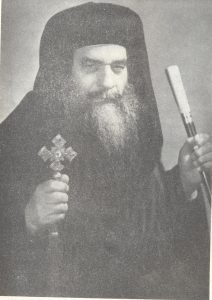 The psalmist says: “The king shall rejoice in thy strength O Lord! And in thy salvation how greatly shall he rejoice! His glory is great in thy salvation: Honour and majesty hast though laid upon him” (Ps. 21 1&5.)
The psalmist says: “The king shall rejoice in thy strength O Lord! And in thy salvation how greatly shall he rejoice! His glory is great in thy salvation: Honour and majesty hast though laid upon him” (Ps. 21 1&5.)
Now that this prophecy has come true, because we see you rejoicing in the strength of the Lord and in His salvation it is meet for us to say: The Lord has glorified His work in us and we have rejoiced. Ethiopia has heard and she is happy and the peoples of Orthodoxy have rejoiced. In your modesty, the Lord has granted you glory and has given strength to Orthodoxy with you.
In truth we the Heads of Oriental Orthodox Churches happily assembled here would not have brought about this meeting. God has singled you to bring this service to Orthodox peoples. For this and for all your previous services, you have deserved to be called the Defender of the Faith in the twentieth century.
As Faith came to Ethiopia through the see of St. Mark, so have you, by the grace of God, been able to bring this service not only to the see of St. Mark but to all the Oriental orthodox Churches. I remarked this Conference that the Lord has blessed Ethiopia from olden times. The Nile river flows down from her mountains to bring life to millions of human beings, and from this Conference held on the mountains of Ethiopia will flow the inspiration for the spiritual strengthening of Orthodox peoples. As you upheld the word of the Lord in the past, so will the Lord uphold you.
Beloved brother Patriarchs, Bishops and other members of the orthodox Clergy assembled in this Hall.
God has in His Divine Providence permitted that this Meeting of ours should take place, so that our hearts may be bound in the unity of Spirit which is love. We hope that this meeting will be followed by many other meetings and we are confident that Divine Providence will uphold the spiritual advancement of our Orthodox Churches by the means of this unity and these sacred ties. As for the decisions which the Conference has unanimously approved, God will help us to implement them in order that they should bring forth their fruit.
Your Imperial Majesty, Brothers,
For myself, I should praise the Lord who has granted me – through your prayer- strength so that I may join you and enjoy your holy company. May God Almighty give the world the blessing of peace and security and may He preserve our countries and our governments and their heads. May God Almighty preserve our beloved Orthodox brother Emperor Haile Sellassie I and the Crown Prince and the other members of the Imperial Family. We ask him to preserve the life of our brothers the Patriarchs of Orthodoxy and to glorify His name in their persons. We ask Him to bring health to our dear brother Anba Basilios, Patriarch-Catholicos of Ethiopia, to bless the Bishops, clergy, people of Ethiopia and the churches and peoples of Orthodoxy.
REPLY OF H.H. MORAN MAR IGNATIUS YACUB III
Your Imperial Majesty, Holy Fathers and Brothers, beloved Clergy and people

Today is a day of rejoicing and thanksgiving. We rejoice as we were privileged to meet as members of the Oriental Orthodox Churches, sharing the common faith and communion after centuries of isolation, and also because God has enabled us all to meet in one mind and heart, and discuss with frankness matters of common concern in an atmosphere of brotherly love, and decide to take steps not only to establish closer contacts with each other and better understanding with churches, but also we decided to take steps to meet the challenges of the changing times, thus enabling our churches both as a group and severally better instruments in the hands of God for the extension of His Kingdom.
All this would not have been possible but for the fact that His Imperial Majesty Haile Sellassie I, Defender of the Faith, had not shown courage, faith, wisdom and vision to bring us together. This had not been an easy task. Apart from the tremendous cost and work involved in the convening of such a Conference, the arrangements, which could never be excelled, His Majesty’s guidance in this Conference, His deep-rooted Christian faith, knowledge, devotion and humility had been a source of inspiration to us all. We are proud of Him and His country. We have always prayed for Him as our one and only Orthodox King, and we shall continue to pray for Him and His people. May He Live for many more long years to come. May He be blessed to help to execute the decisions of this first Conference as Constantine for the Council of Nicea.
The great hospitality and love shown by His Holiness the Patriarch of Ethiopia, the Archbishops, bishops, clergy and the faithful of this great country has far excelled even our wildest imaginations. We pray for the restoration to health of His Holiness Patriarch Basilios. May the Almighty bless all the leaders and the people of both this great church and this great country.
Our Churches have gone through in the past great difficulties and trials and there were real moments of darkness. Many of Our Churches had to fight for their very existence. But through it all our fathers maintained undefiled the faith that had handed to them. God will never forsake His Church. He said “Lo, I am with you always”.
This Conference surely is a sign of this promise. Holy Spirit was present throughout, and His hand of guidance was visible in our midst. As we go back to our respective lands, may we take back this spirit of Addis Ababa with us. We are determined that the forward steps we have taken in the many-sided activities of the Church will never be reversed. We return with confidence that from now on the Oriental Orthodox Churches are not more the isolated pockets which shared a common heritage and faith, but a united and living organism, determined to work together for the glory of God.
With thankful hearts and penitent sprit, may we pray the Almighty to fulfil in and through us purpose He has for us.
REPLY OF H.M MORAN MAR BASELIOS AUGEN I CATHOLICOS OF THE EAST
Your Imperial Majesty, Holy Fathers, Eminent Brothers, Clergy and People
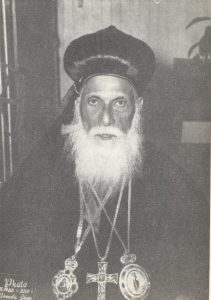
It is with a heart full of joy and thankfulness that I stand here today. I am reminded of the words of the old Simon when he saw the child Jesus. Simon had been waiting to see the consolation of Israel. When he saw the child Jesus, he knew that salvation had come to his people. His heart was filled with joy and he sang to the glory of God.
This day is a great day for all of us, and for our Churches. We have always been one in our faith, but for centuries our Churches lived in isolation. That isolation has been broken. At this conference, our Churches have been brought together once again. In brotherly love, we considered our problems together. We made many unanimous decisions. We have seen a new beginning for our ancient Churches. Our hearts go out in gratitude to God.
On this historic occasion, we all want to say a special word about His Imperial Majesty, Haile Sellassie I, Emperor of Ethiopia. He reminds us of some of the great Christian Emperors in the early history of the Christian Church. It was His vision that brought us together. In His very inspiring opening address. His Imperial Majesty remained us about the duties of the Church in the modern world. His wisdom, piety, and love of peace have been an example for us. The vast amount of money, the time, and the energy spent on this conference showed how much His Imperial Majesty is concerned about the good of the Church. At this time I specially remember His Imperial Majesty’s visit to India and the interest He took in the Church in India. I am confident that I am voicing the thought of all of us when I speak of His Imperial Majesty as the Defender of the Orthodox Faith. In the name of us all, I place on recorded our grateful thanks to His Imperial Majesty. May God bless Him and the Imperial family.
The Ethiopian Orthodox Church and the Imperial Ethiopian Government have made our stay in Ethiopia a very happy experience, and we are all grateful to them. The ties that bind the Ethiopian Orthodox Church with our church in India are very ancient. When the invitation to this conference came, my old age and physical infirmity made me hesitate. But my life-long desire to renew contact with this ancient sister-Church encouraged me to undertake this long journey from far-off India. I am now glad that I came.
At the celebration of Epiphany the other day, we saw something of the special traditions that this Church developed over the centuries. The singing of the Debteras thrilled all of us. We sister-Churches have much to learn from Ethiopia. The only thing that made me sad was that His Holiness Abuna Basilios, the Patriarch, was not able to be with us in the meetings. We shall al pray for His Holiness’s health.
I shall be falling in my duty if I do not say a work of thanks to His Excellency, the Secretary-General, who conducted our meeting so efficiently. I want also to thank all those others who remain unnamed but worked hard for the success of this conference. Those who looked after our comforts at the residences and on the way deserve our gratitude. On behalf of us all, I thank them all most sincerely.
Addis Ababa is a city blessed by God. The spirit of unity and brotherhood which we experienced here will go forth from this city to all the lands from which we came. In this blessed city, we have gained a new vision of the glorious vocation of the Church. The Bride of Christ is arrayed in the glory of her Bridegroom, and we rejoice. We sing with the Prophet Isaiah “Enlarge the place of the tent, and let them stretch forth the curtains of thine habitations: spare not, lengthen thy cords, and strengthen thy slakes; for thou shalt break forth on the right hand and on the left; and thy seed shall inherit the gentiles, and make the desolate cities to be inhabited:. (Isa. 54: 2-3)
REPLY OF HIS BEATITUDE ABUNA THEOPHILOS ACTING PATRIARCH OF ETHIOPIA & ARCHBISHOP OF HARAR
Holy Fathers and Brothers in Christ,
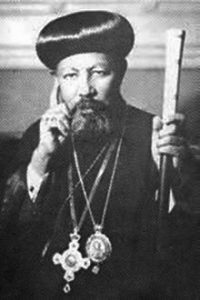
It is with a heart full of gratitude to Almighty God that I stand here at this time. This is indeed an occasion of unbounded joy for us in Ethiopia and for me personally the happiest moment In my life. Ethiopia is blessed by your visit, and will remember this glorious event for many long years to come. So it is my most pleasant duty and privilege to express, on behalf of the Ethiopian Orthodox Church and of my own humble self, the gratification we all enjoy on this auspicious occasion.
As Heads and Leaders of a great tradition in Oriental Christendom, you have come to Ethiopia representing oldest Churches in the world. We are most grateful to each and every one of you for your kindness in visiting us and graciously taking part in this historic conference.
Ethiopia as an Orthodox Christian country is readily accessible to any of you at any time, and we would like you to take advantage of this situation and visit us whenever you can. We are able to confidently affirm this because our Emperor is a most devout member and protector of the Church, because His Imperial Majesty Haile Sellassie I and the royal family are noted both in Ethiopia and in the outside world for their love of the Church. As you are well aware, the one man whose far-sighted vision and a determined effort made the convocation of this Conference possible is His Imperial Majesty.
In the history of the Church, beginning from the time of Emperor Constantine the Great of the Roman Empire in the fourth century, there have been many faithful Emperors and rulers of Kingdoms who have taken the imitative in convening Councils and Synods of the Church.
His Majesty stands in the tradition of those great men, and the convocation of this Conference marks the crowning act or His illustrious service to the cause of the Church. It is therefore, our most pleasant duty to thank him for what he has done, to convey to him the Church’s blessings and pray for his long and peaceful life and prosperous reign.
Holy Father and Brothers, your coming to this Conference has inaugurated a new era for our Churches. As you well know, the ancient Orthodox Churches had maintained their unity till the fifth century, when they underwent an unfortunate division which continues to this day. We hop and pray that God will bring together again the two traditions which thus came to be formed. Our own Oriental Orthodox Churches, however, have always stood together as branches of the same Church. At the same time historical and various other factors did not leave us free to convene common synods and Councils of all our Churches for the last many centuries. Consequently, our Churches were isolated one from another, so that while being one Church in principle, we have come to be considered as many Churches.
It is against such a background that we have met in this Conference. With a view to restoring healthy and fruitful channels of communication and co-operation, we have taken here a number of important decisions. We have agreed thus, insofar as possible, we shall work together in the fields of evangelism, theological education, ecumenical action, and world peace. As a result , of which we shall all experience, we hope a concrete manifestation of the unity in the spirit which exists among our Churches.
Even here the first thing which e need to face is the question of the nature of our calling in the one Church. We are called to bear witness to Jesus Christ, the incarnate crucified and risen Lord, and to serve our fellow human beings in His name and His spirit. So our Churches should become communities filled with spiritual dynamism to fulfil the task entrusted to us by the Lord of the Church. Here our ideal is that specified by our Lord Himself when He said, “Be ye perfect even as your heavenly Father is perfect”. As we follow this great idea, we shall experience the meaning of the heavenly peace which our Lord Jesus Christ has promised us by His words, “My peace I give unto you.” Our Lord Jesus Christ, who in His High-Priestly prayer be sought that His disciples may ever remain united, will bless and sanctify our life and work together.
Besides the question of bringing our Church together again we have taken time at this Conference to discuss our future relationship with other Churches, and agreed to do all we can to help the movement towards the unity of all Christians in the fellowship of the Church. We believe that of the many bodies into which Christendom is divided, the one nearest in spiritual Kinship to our Churches is the Eastern Orthodox Church. We trust in God that He will lead both our Churches to feel urged to evaluate the positions of each other objectively in a spirit of Christian charity and mutual appreciation, so that they may, under the guidance of the Holy Spirit, be restored to unity.
In giving expression to this longing, we do not imply that our concern for Christian reunion is limited to the East.
We believe that there is only one ideal for Christian reunion, and that is what our Lord has clearly specified in His Prayer. He prayed that His disciples may remain eternally united in the same way as God the Father and He Himself are one and remain united. In our thinking. Christian reunion has behind it no ulterior motive of securing earthly glory or temporal power for the Church, or even of meeting some immediate danger. WE seek reunion because our unity is the will of our Lord. He wants our Christian communities to grow with Him into His perfection. This indeed will require a broadening of our spiritual vision to see all things as Christ sees them. Our search for unity is not a partial search.
We believe that God wants all men to be united with Him. From this concern,we express our longing to see that peace and harmony are established in the world, and pledge that we shall work unceasingly for the peace of the world and the establishment of justice between man and man nation and nation.
May God lead all Churches in the world to realize this truth, and may the beginning of a new era for our Churches, which this Conference has initiated, help us to advance together in doing His work.
Holy Fathers and Brothers, our Conference has come to its close. To all of you, I express once again our sincere thanks. May God be with you in your journey back to your respective Churches, and may He bring us together again. We shall remember you constantly in our prayers, and may we request that you do the same for us also. Visit us whenever you can, and do keep us in touch with how you and your Churches are faring.
May the blessing of Holiest Trinity, the Father, the Son and the Holy Spirit, be upon us all and our Churches, His Imperial Majesty, and the royal family,
AMEN.
The Lion of Judah

Copied from;
The Oriental Orthodox Churches Addis Ababa Conference January 1965
Edited by the Interim Secretariat
Oriental Orthodox Conference
Addis Ababa – August, 1965
COPIED FROM: http://www.theorthodoxchurch.info/aacp/
PATRIARCH’S
Coptic Orthodox

Syraic Orthodox

Armenian Orthodox
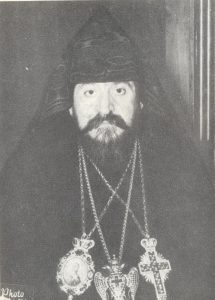
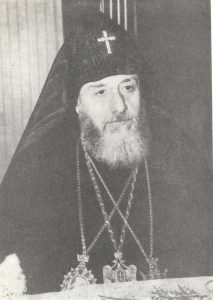
Ethiopian Orthodox
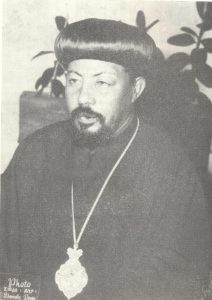

Indian Orthodox

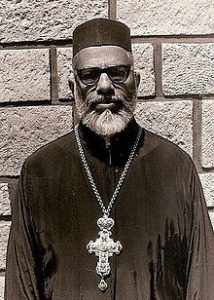
The Lion of Judah

Seal of Emperor Haile Selassie Ist

